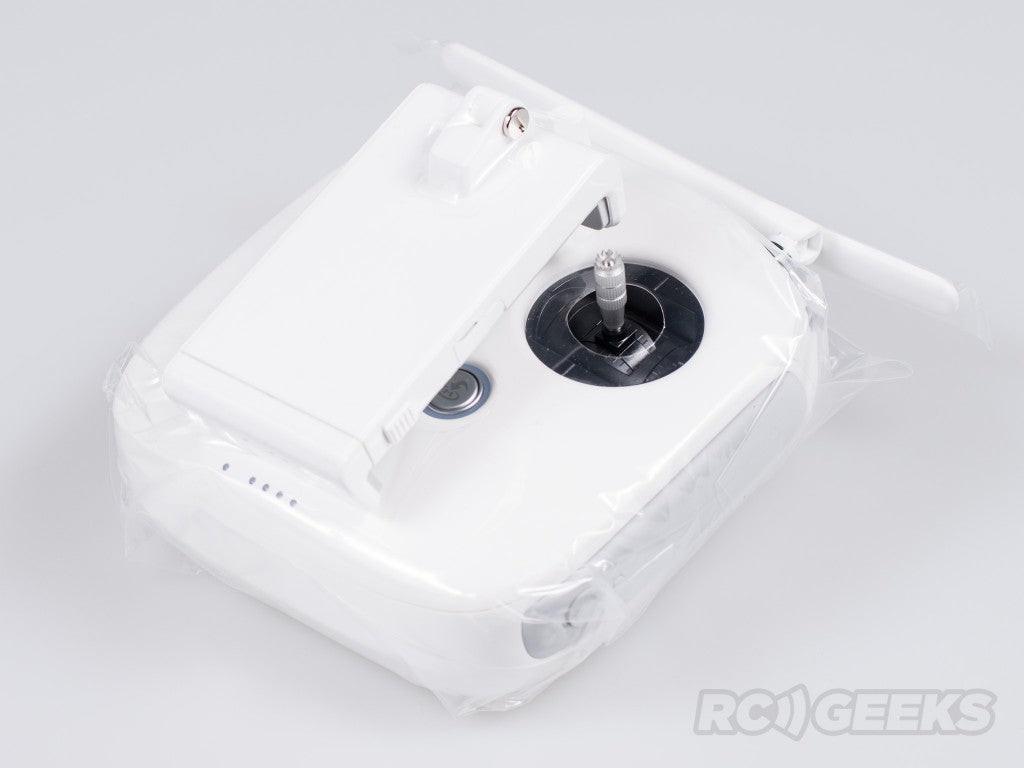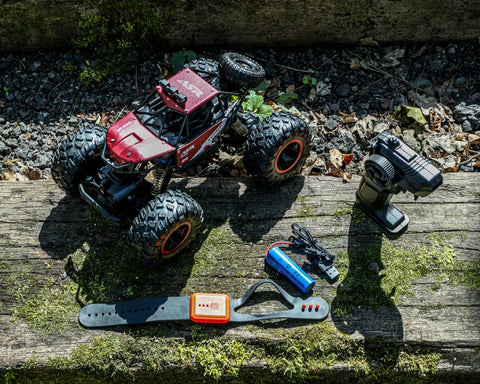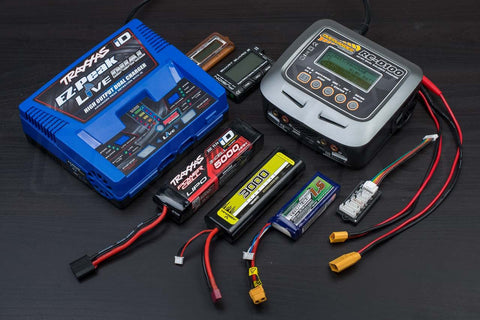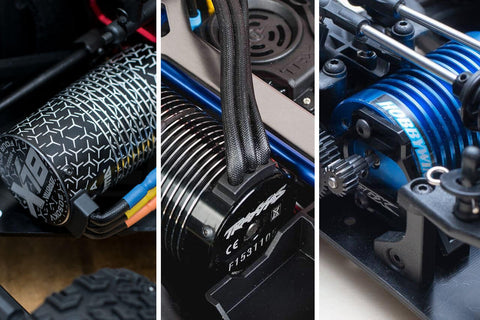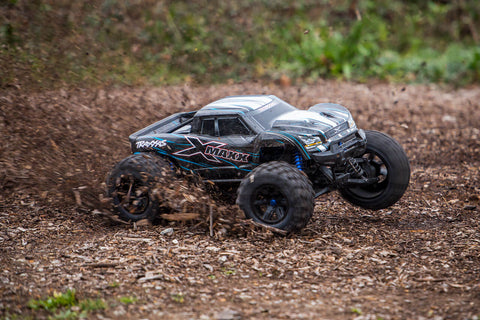This week DJI's brand new Phantom quadcopters, the Phantom 3 Professional and Phantom 3 Advanced touched down at our Crawley offices.
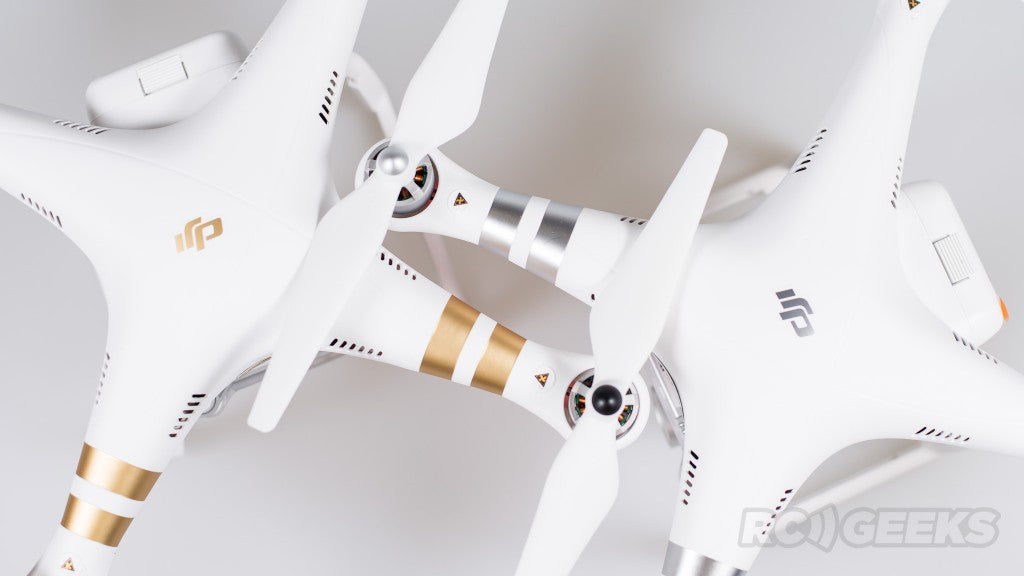 Although we have had our hands on potentially pre-production units at the recent DJI launch; we have waited for this, the retail model to arrive to ensure this unboxing experience would mirror your own.
Although we have had our hands on potentially pre-production units at the recent DJI launch; we have waited for this, the retail model to arrive to ensure this unboxing experience would mirror your own.
 Lets take a closer look at the new package. Measuring 365 x 210 x 390mm and weighing in at 4.2kg, it is taller, narrower and lighter than the outgoing Phantom 2 Vision Plus v3.0 box.
Lets take a closer look at the new package. Measuring 365 x 210 x 390mm and weighing in at 4.2kg, it is taller, narrower and lighter than the outgoing Phantom 2 Vision Plus v3.0 box.
 The gold stickers and plaque highlight the professional edition as the new top-of-the-line model.
The gold stickers and plaque highlight the professional edition as the new top-of-the-line model.
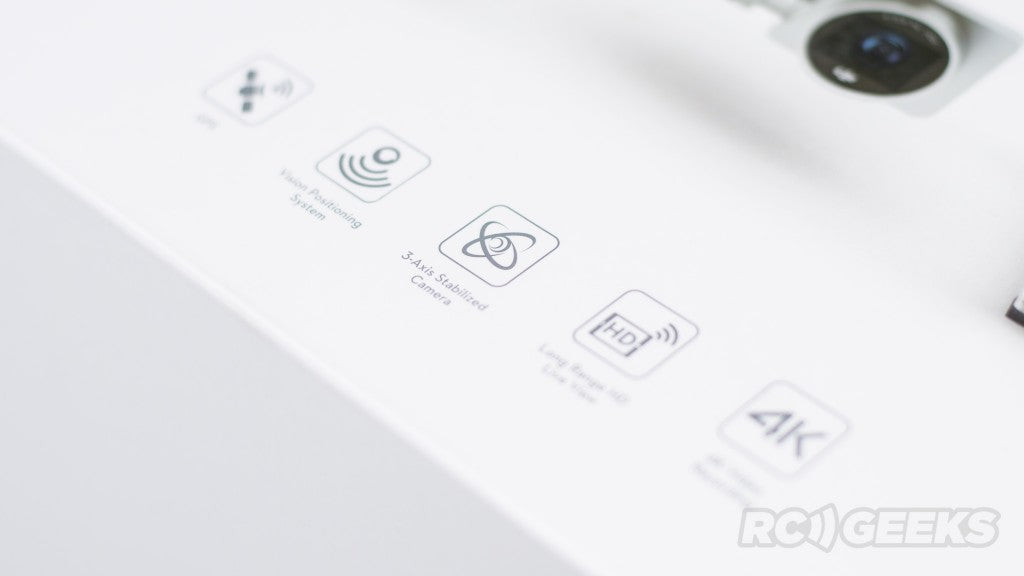
 The magic words we have been waiting for; 4K video @30fps, 1080p video at 60fps and a 12 Megapixel camera that can produce Adobe DNG Raw files.
The magic words we have been waiting for; 4K video @30fps, 1080p video at 60fps and a 12 Megapixel camera that can produce Adobe DNG Raw files.
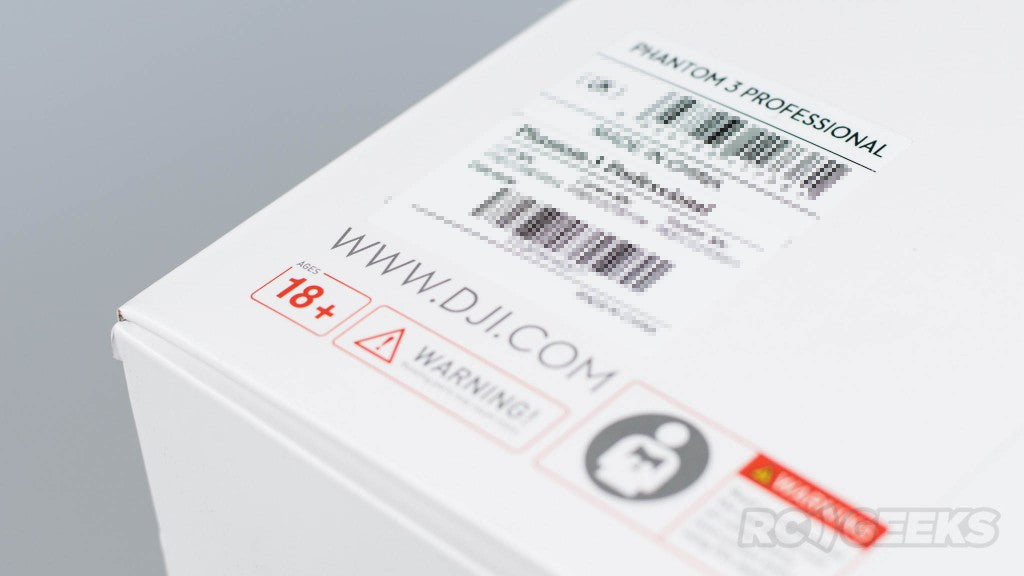
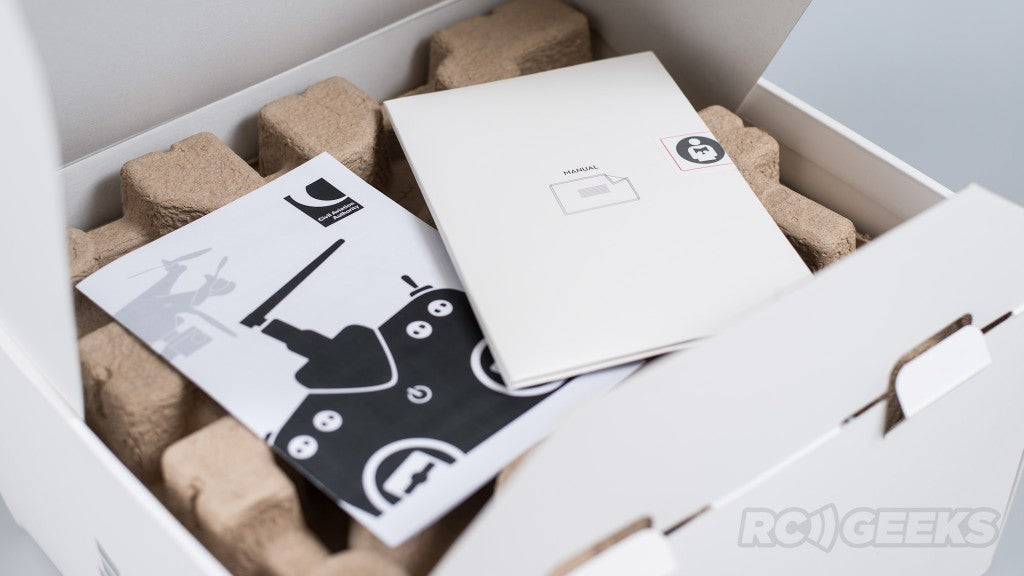 Upon opening the large flap, one of the first things you are presented with is a leaflet from the Civil Aviation Authority.
Upon opening the large flap, one of the first things you are presented with is a leaflet from the Civil Aviation Authority.
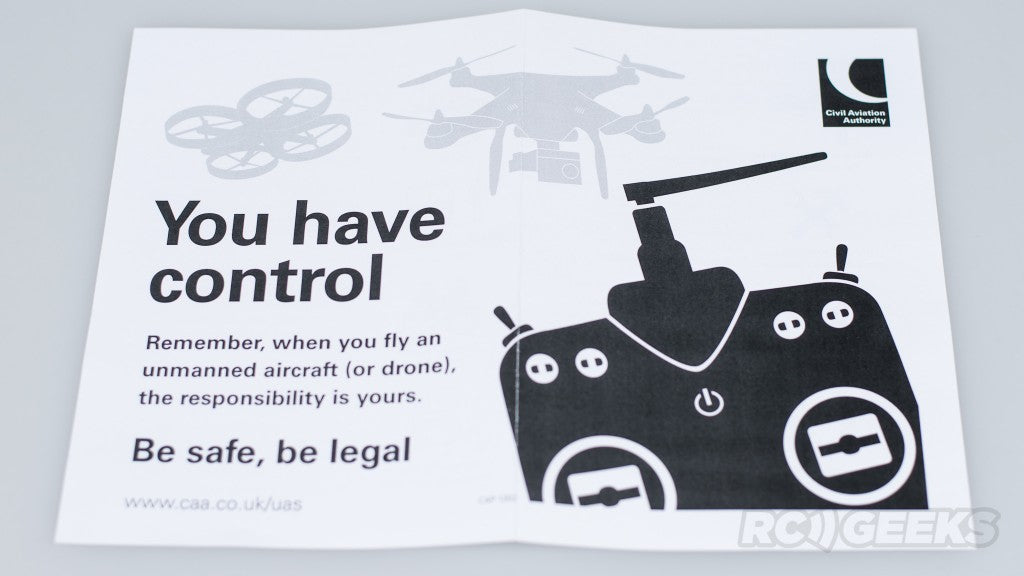 This short flyer gives you a primer into the legalities of piloting a quadcopter in the UK and is in our opinion a great touch. Its good to see that DJI are working with the CAA to educate consumers, hopefully protecting the future of the hobby for us all.
This short flyer gives you a primer into the legalities of piloting a quadcopter in the UK and is in our opinion a great touch. Its good to see that DJI are working with the CAA to educate consumers, hopefully protecting the future of the hobby for us all.
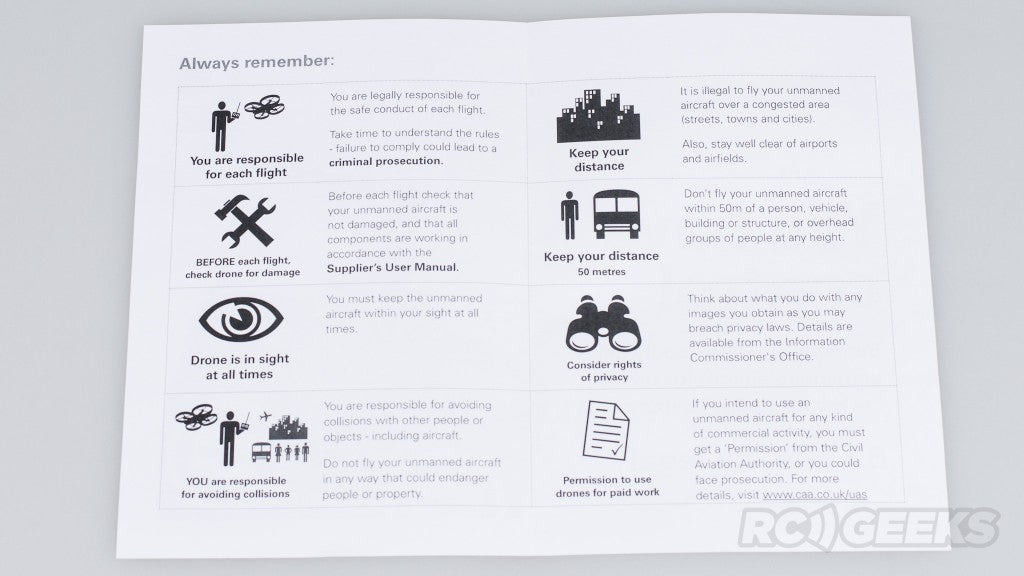 Alongside the flyer, on-top of the familiar 'egg-box' packaging, is the manual bookpack.
Alongside the flyer, on-top of the familiar 'egg-box' packaging, is the manual bookpack.
 This contains the quick start guide, safety guideline and disclaimer leaflet, a pamphlet on the intelligent flight battery, a range of arm stickers and also a 'in the box' contents card.
This contains the quick start guide, safety guideline and disclaimer leaflet, a pamphlet on the intelligent flight battery, a range of arm stickers and also a 'in the box' contents card.
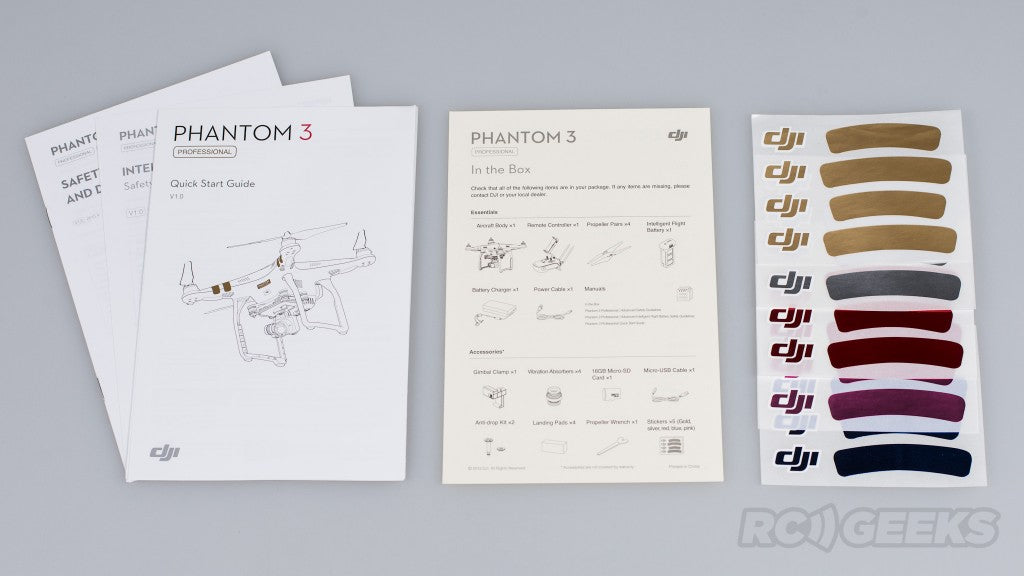 If you would like a closer look at any of these, they are all available in digital format on the DJI downloads page (which is also where you will find the latest firmware updates).
If you would like a closer look at any of these, they are all available in digital format on the DJI downloads page (which is also where you will find the latest firmware updates).
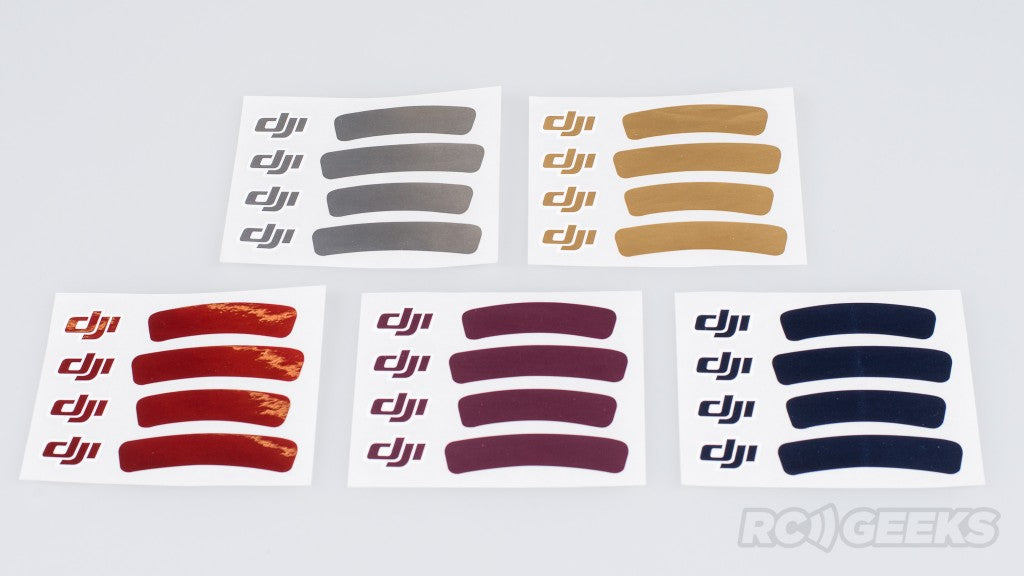 Phantom 3 Professional's come with 5 different sets of stickers. Matte metallic silver and gold (as found as standard on the Advanced and Professional) and gloss metallic red, purple and blue sets.
Phantom 3 Professional's come with 5 different sets of stickers. Matte metallic silver and gold (as found as standard on the Advanced and Professional) and gloss metallic red, purple and blue sets.
 The above shot hopefully gives you a better feel for the finish of the two sets.
The above shot hopefully gives you a better feel for the finish of the two sets.
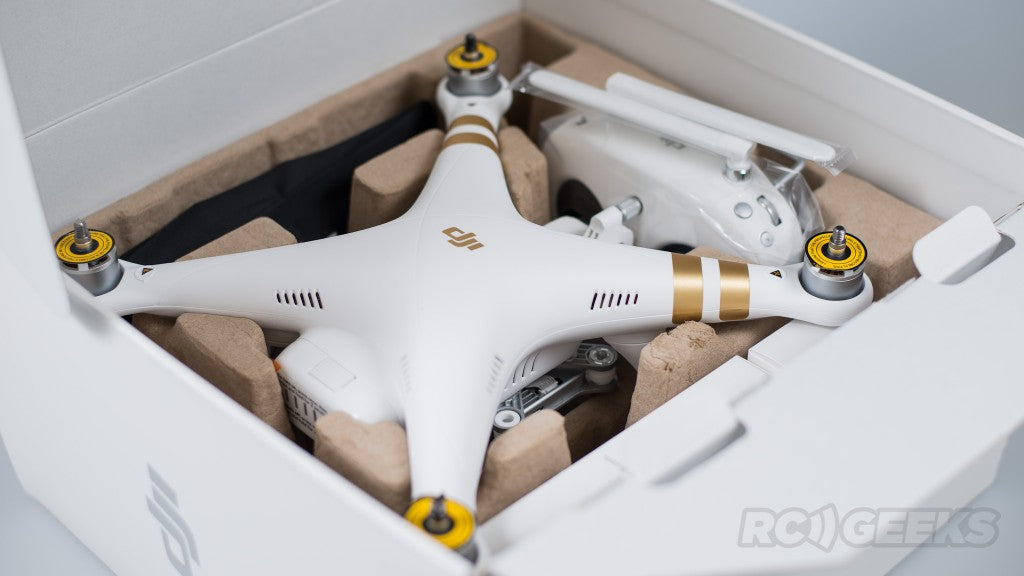 With the egg-box lid removed, we are presented with the familiar Phantom silhouette surrounded by its new accessories.
With the egg-box lid removed, we are presented with the familiar Phantom silhouette surrounded by its new accessories.

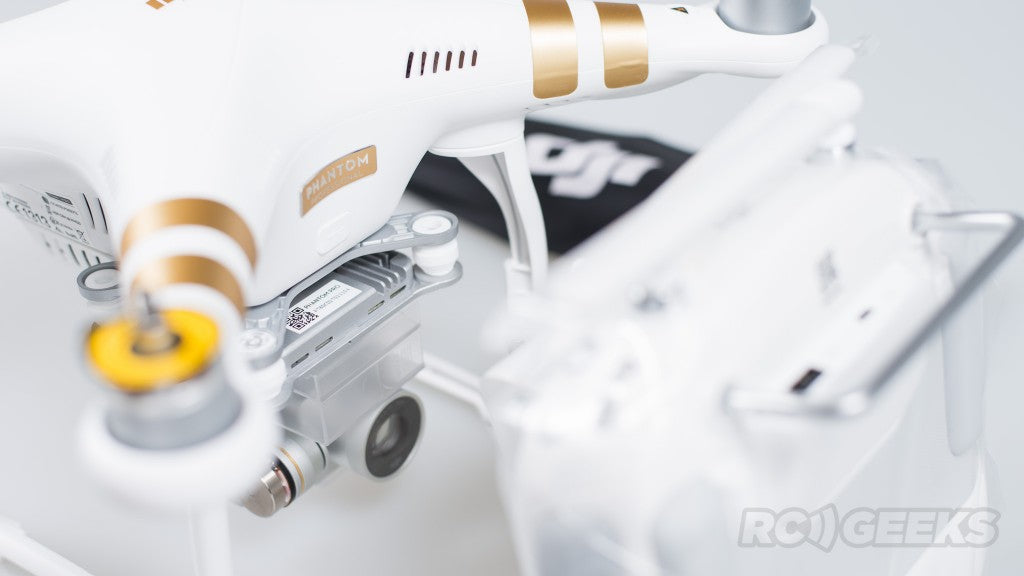
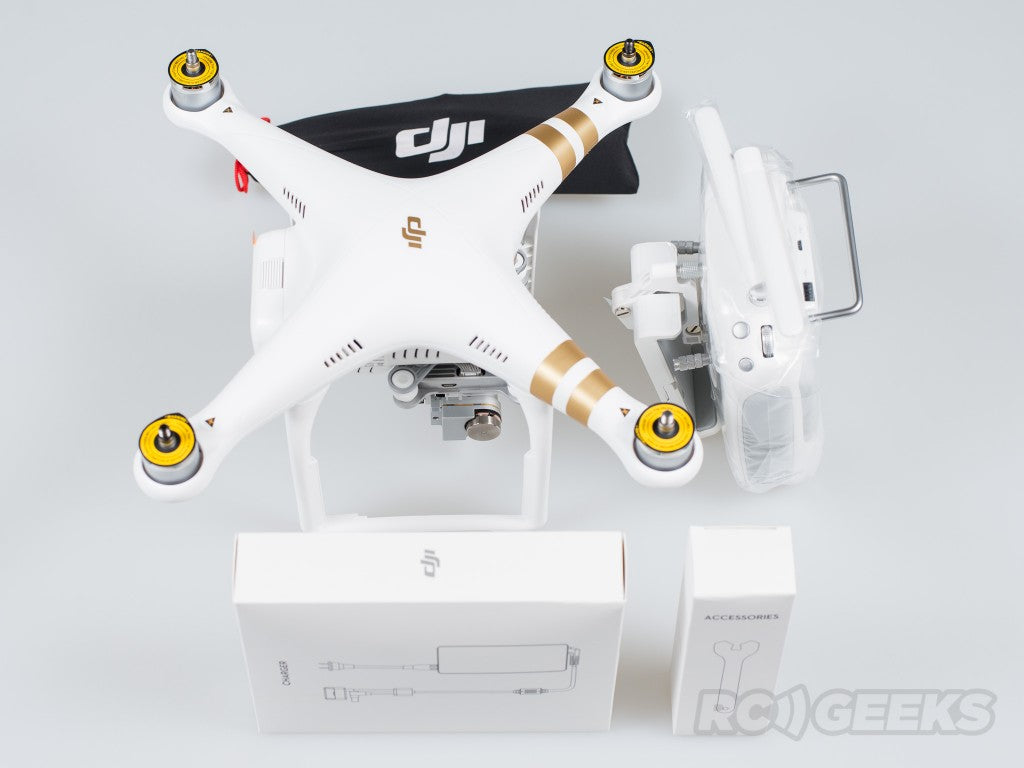 The individual elements free'd from their protective carton. The craft itself is bordered by the propeller pouch, the all-new transmitter, the charger and also an accessories box.
The individual elements free'd from their protective carton. The craft itself is bordered by the propeller pouch, the all-new transmitter, the charger and also an accessories box.
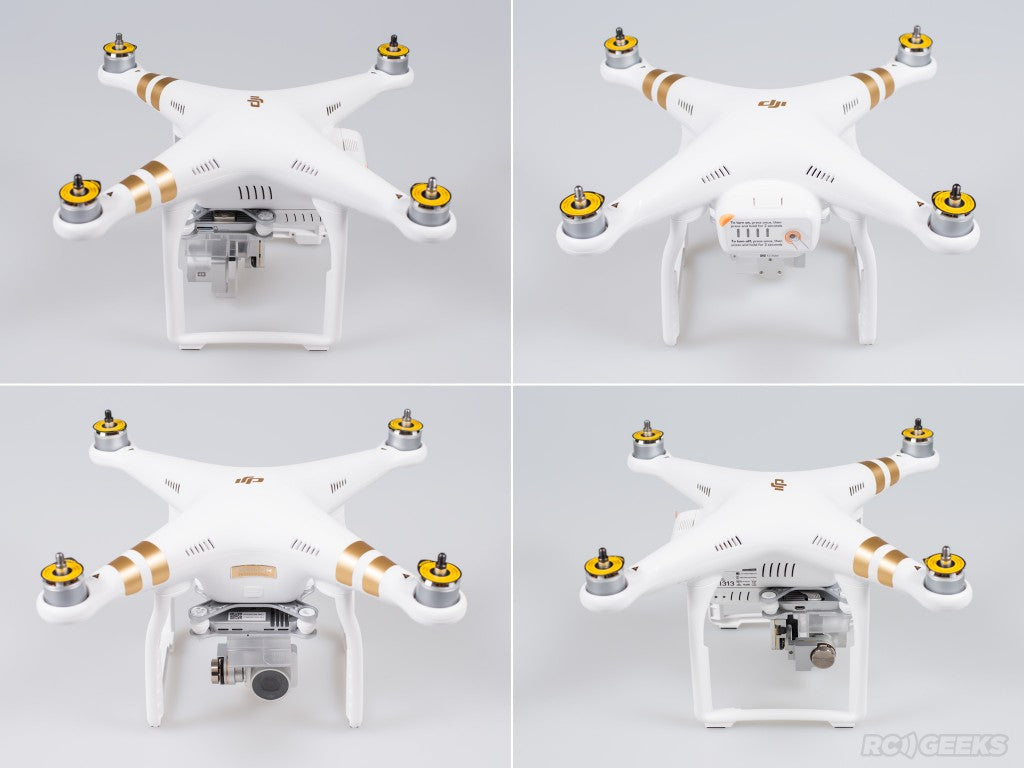
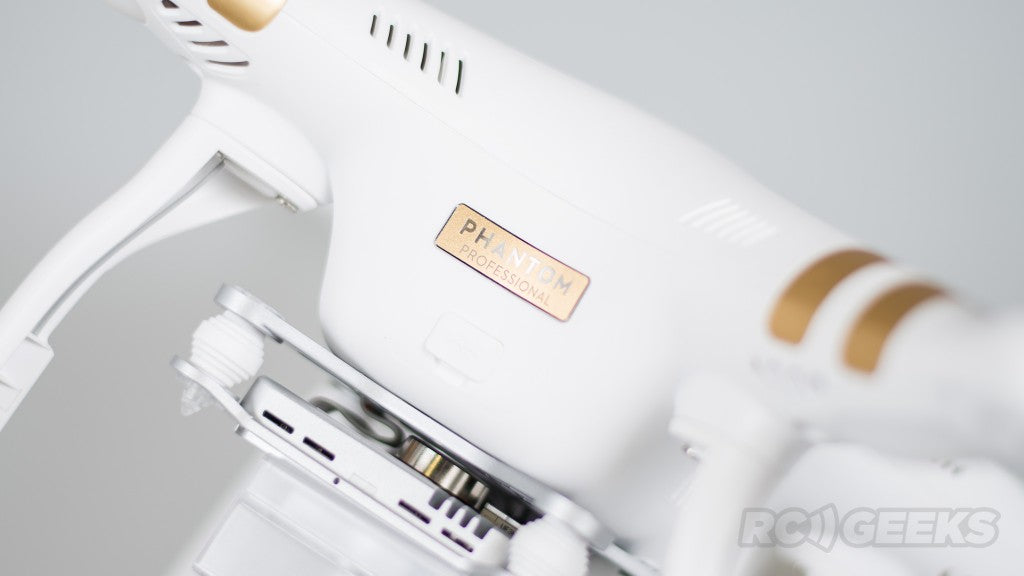 The Phantom 3 Professional has a gold placard badging it as such on the front of the body. Differing from the 'Phantom 4k' as seen on others, potentially pre-release or non-UK market models elsewhere on the internet.
The Phantom 3 Professional has a gold placard badging it as such on the front of the body. Differing from the 'Phantom 4k' as seen on others, potentially pre-release or non-UK market models elsewhere on the internet.
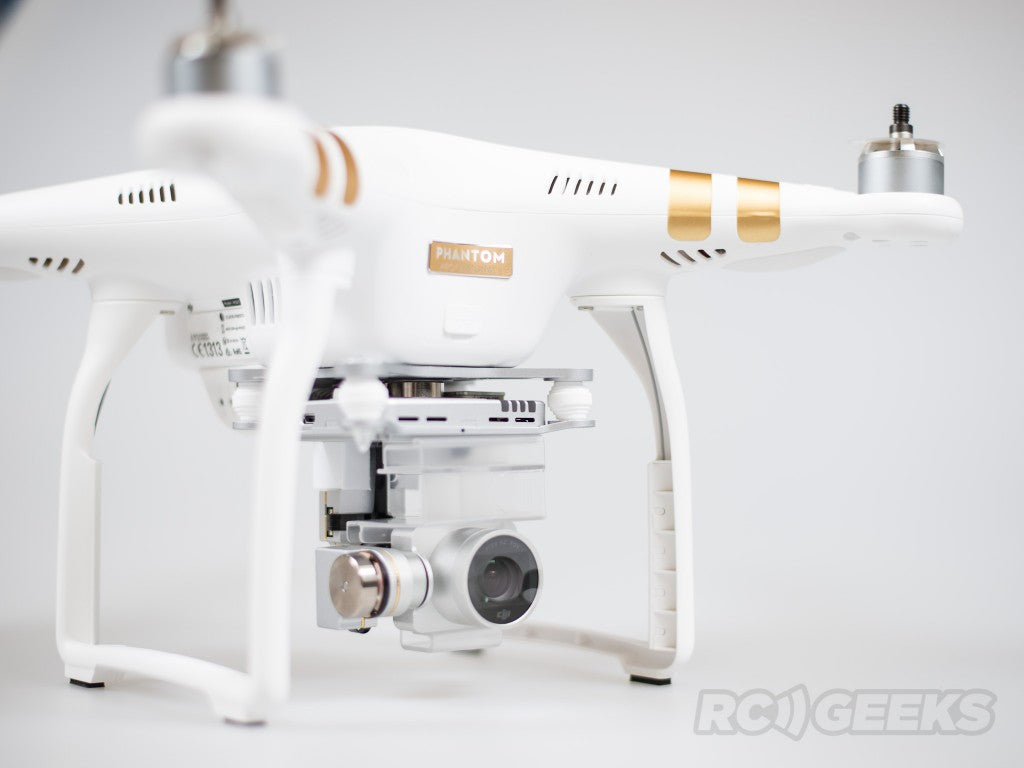
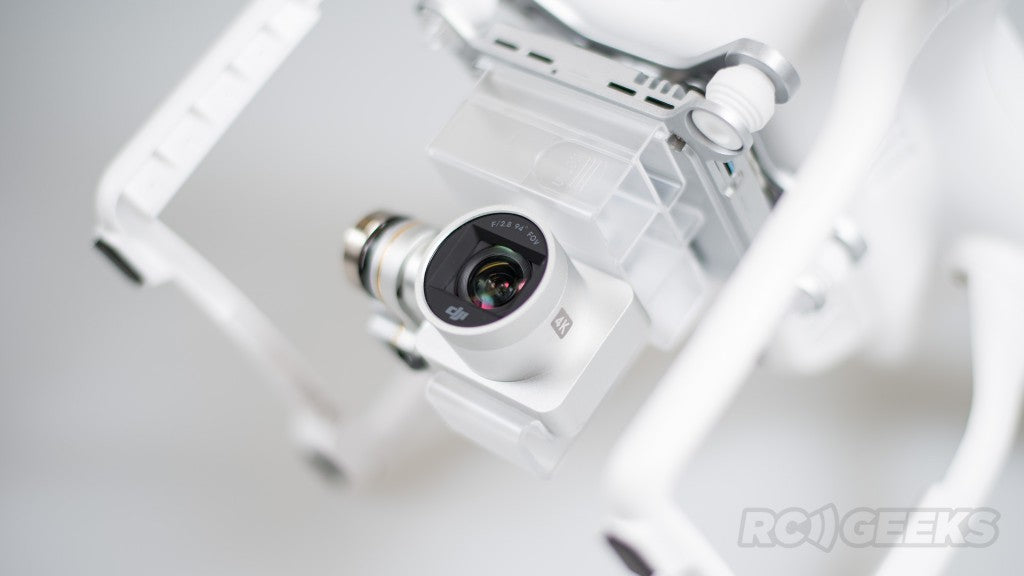 DJI have done away with the lens cap found on the Vision Plus. Out of the box the new larger lens has a protective film you should remove.
DJI have done away with the lens cap found on the Vision Plus. Out of the box the new larger lens has a protective film you should remove.
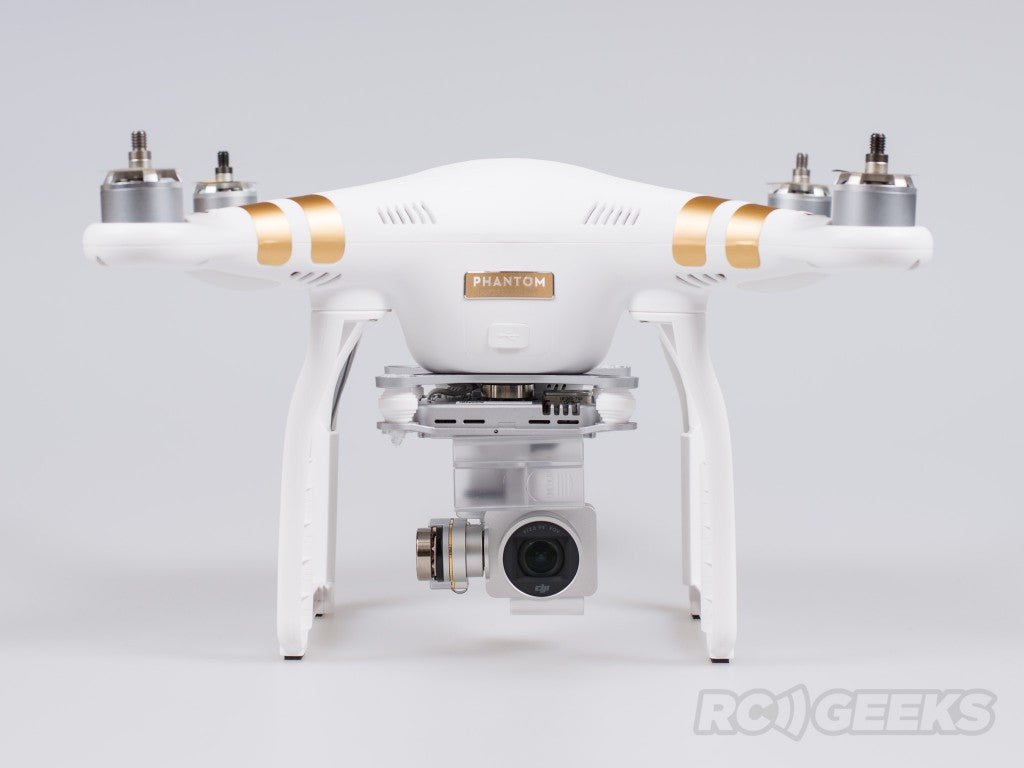 The 3-axis brushless gimbal is all new, resisting the motion of the craft (and removing the effects of turbulence and vibration from the picture) whilst allowing the camera to Pitch -90° to +30° from horizontal via the transmitter.
We recommend holding onto the gimbal clip and replacing it when the craft is not in use. It will ensure the camera is supported in place on the gimbal, protecting it and it's brushless motors from flapping around.
The 3-axis brushless gimbal is all new, resisting the motion of the craft (and removing the effects of turbulence and vibration from the picture) whilst allowing the camera to Pitch -90° to +30° from horizontal via the transmitter.
We recommend holding onto the gimbal clip and replacing it when the craft is not in use. It will ensure the camera is supported in place on the gimbal, protecting it and it's brushless motors from flapping around.
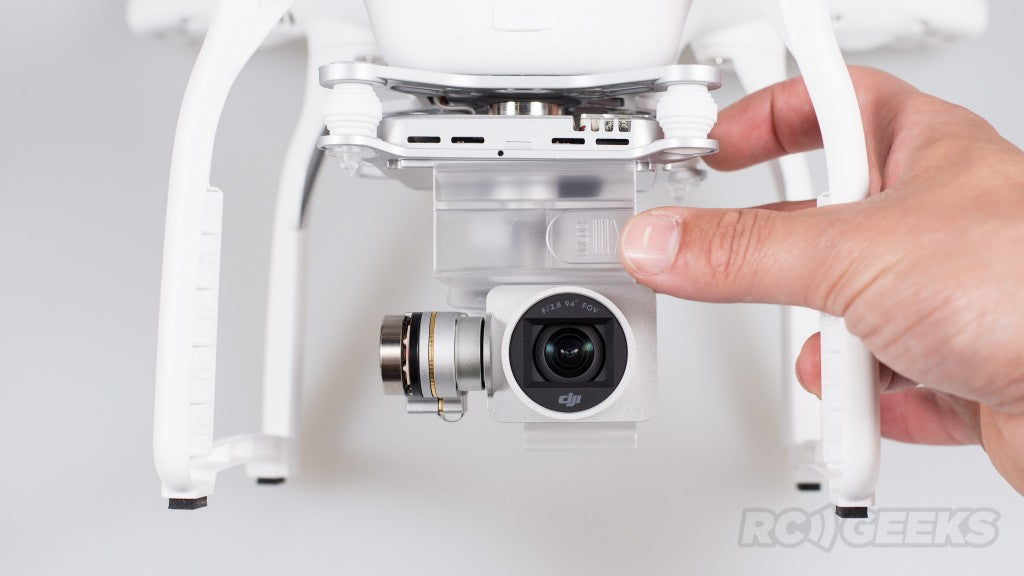 Remove the gimbal clamp by sliding it to the right (when facing the nose of the aircraft), as shown above
Remove the gimbal clamp by sliding it to the right (when facing the nose of the aircraft), as shown above
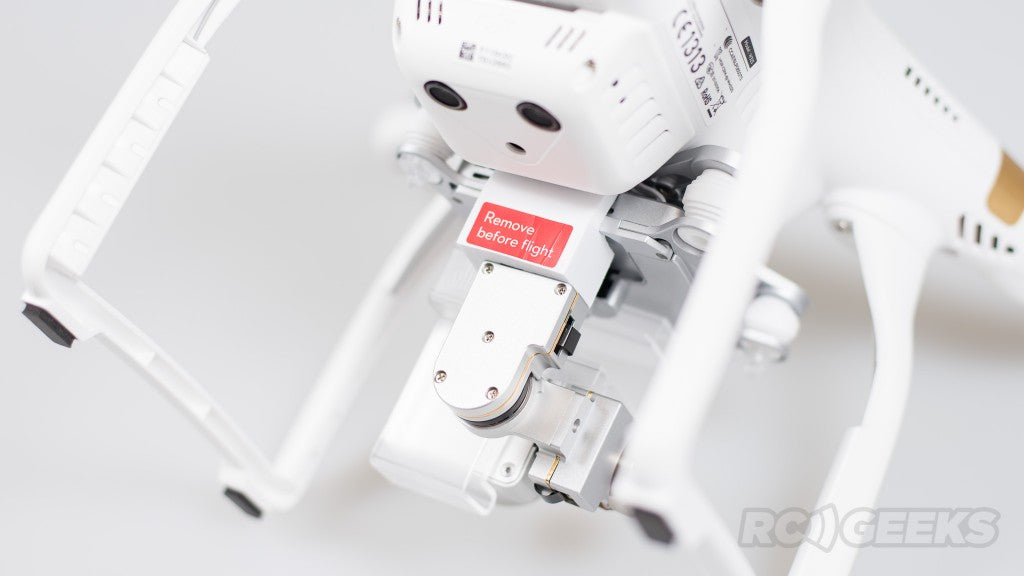 The Phantom 3 also has a foam support section in the back of its special 3-axis brushless gimbal, which also needs to be removed before flight.
The Phantom 3 also has a foam support section in the back of its special 3-axis brushless gimbal, which also needs to be removed before flight.
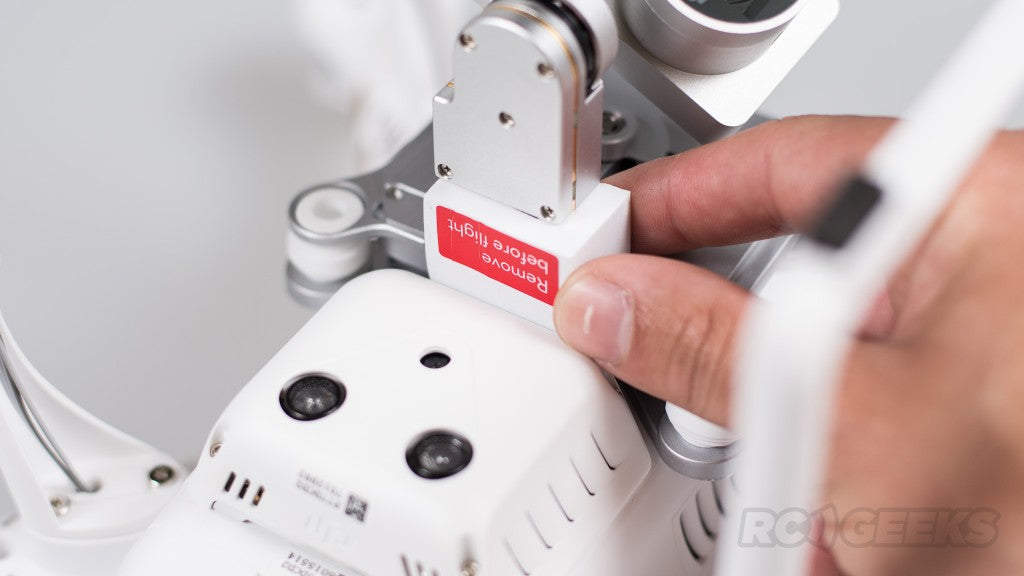 Placing the craft upside-down on a table makes it easy for this to be pinched and carefully removed. Here we can also see the new optical-flow sensor panel. Twin ultrasonic sensors and a camera aid the flight controller in keeping the craft steady by constantly taking readings from the ground below (between 3m and 30cm).
This alongside twin satellite positioning systems (GPS and now also GLONASS) promise some solid flight characteristics.
Placing the craft upside-down on a table makes it easy for this to be pinched and carefully removed. Here we can also see the new optical-flow sensor panel. Twin ultrasonic sensors and a camera aid the flight controller in keeping the craft steady by constantly taking readings from the ground below (between 3m and 30cm).
This alongside twin satellite positioning systems (GPS and now also GLONASS) promise some solid flight characteristics.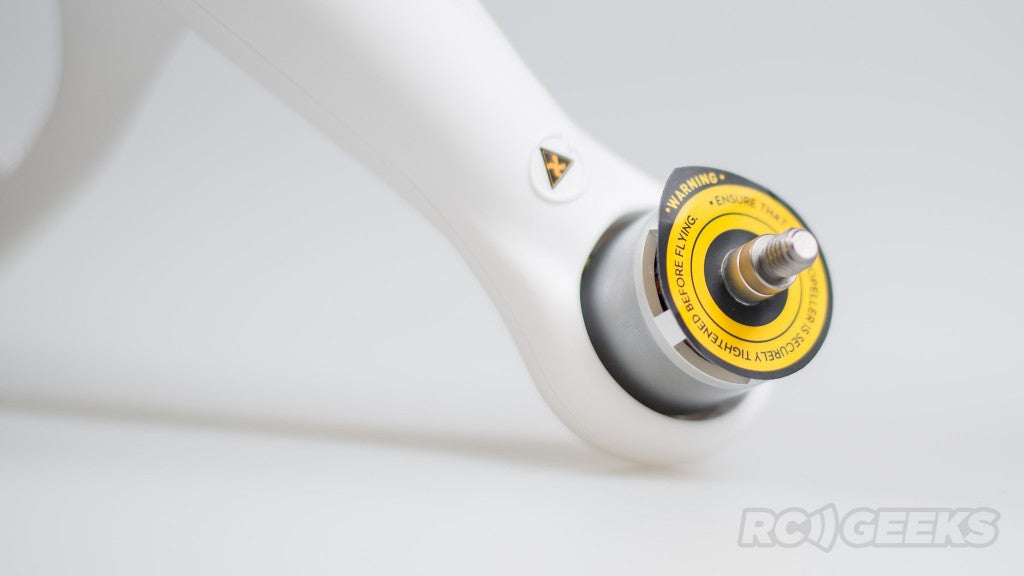 The Phantom 3's motors are labelled with dots to aid the attachment of the propellers. You will note that two opposing motors have silver dots on-top of the threads, whilst the other two motors have black dots on-top of the threads. Remove the yellow stickers (no longer cards) on-top of the motors before attaching the propellers.
The Phantom 3's motors are labelled with dots to aid the attachment of the propellers. You will note that two opposing motors have silver dots on-top of the threads, whilst the other two motors have black dots on-top of the threads. Remove the yellow stickers (no longer cards) on-top of the motors before attaching the propellers.
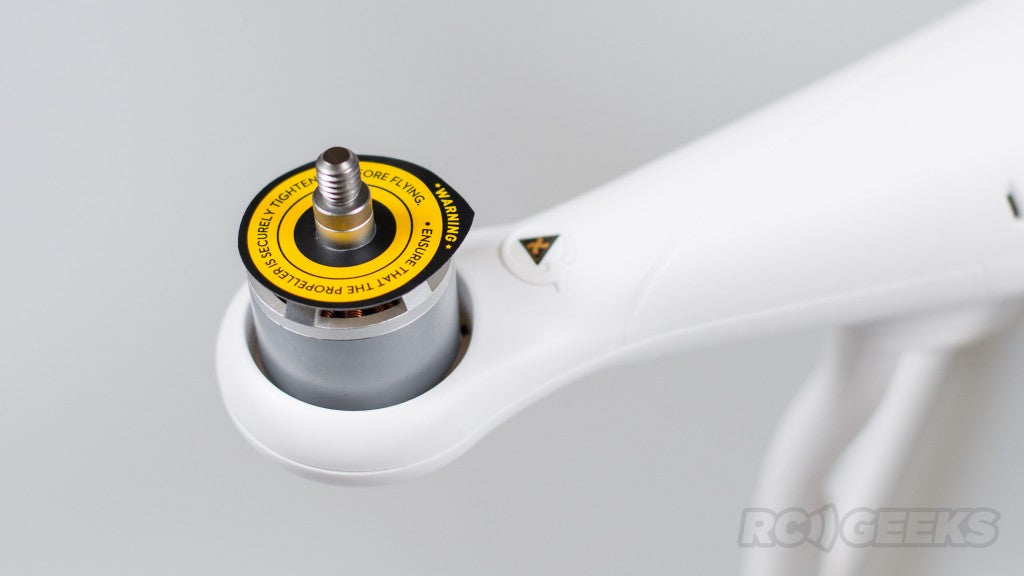 Its extremely important to ensure you match the propeller cone tip colour to the motors tip colour before starting the craft. The silver cone'd propellers tighten in a clockwise fashion, whilst the black cone'd propellers tighten in an anti-clockwise fashion. If you are unsure, please refer to the manual or even give us a call to check. We recommend only hand-tightening the propellers onto the motors.
Its extremely important to ensure you match the propeller cone tip colour to the motors tip colour before starting the craft. The silver cone'd propellers tighten in a clockwise fashion, whilst the black cone'd propellers tighten in an anti-clockwise fashion. If you are unsure, please refer to the manual or even give us a call to check. We recommend only hand-tightening the propellers onto the motors.
 The Phantom 3 comes bundled with a 16GB Lexar 633x UHS-1 (ultra high speed 1) MicroSD card. The largest memory-size the craft can currently handle is 64GB. The included card is more than capable of recording the 23 minutes of 4K footage you could produce on a single battery.
The card comes pre-installed. To remove it simply push it 'into' the gimbal base and it should spring back and pop-out slightly. If you do not have a microSD card reader, you can plug the included micro-USB cable into the opposite side of the gimbal base and use the craft to download images to your computer.
The Phantom 3 comes bundled with a 16GB Lexar 633x UHS-1 (ultra high speed 1) MicroSD card. The largest memory-size the craft can currently handle is 64GB. The included card is more than capable of recording the 23 minutes of 4K footage you could produce on a single battery.
The card comes pre-installed. To remove it simply push it 'into' the gimbal base and it should spring back and pop-out slightly. If you do not have a microSD card reader, you can plug the included micro-USB cable into the opposite side of the gimbal base and use the craft to download images to your computer.
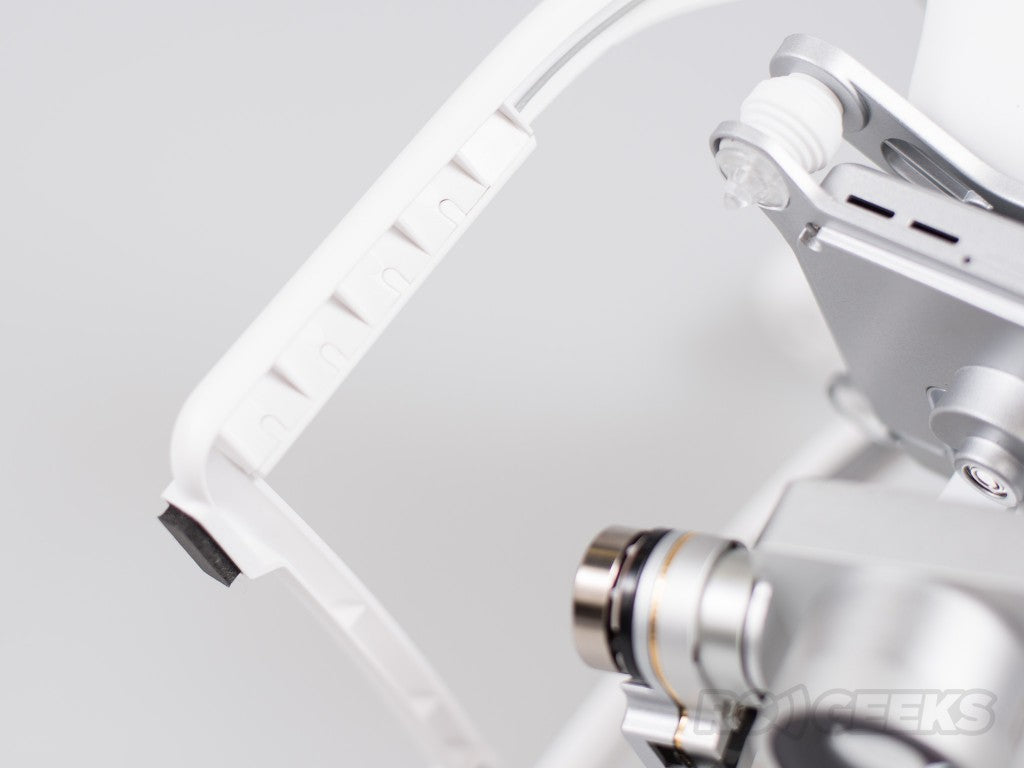 The Phantom 3 has a revised landing gear, now slightly wider in footprint. Each of the legs now contains a patch antenna to support the new massive 2km range. The rear right leg has the compass in its lower section.
The Phantom 3 has a revised landing gear, now slightly wider in footprint. Each of the legs now contains a patch antenna to support the new massive 2km range. The rear right leg has the compass in its lower section.
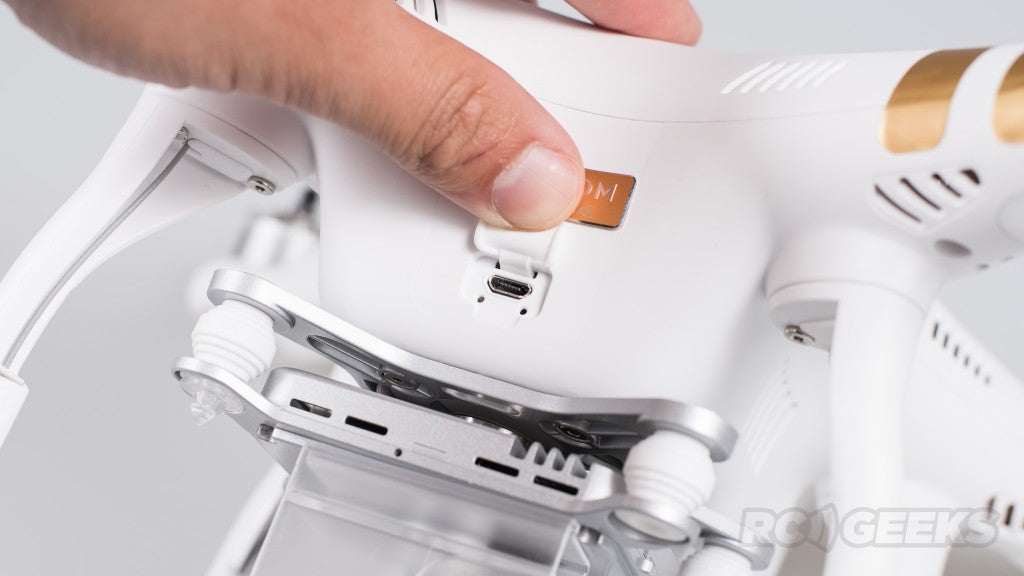 As with previous models, the craft has a micro-usb port for connecting the craft to your computer. Flight data is automatically recorded to the internal storage of the aircraft. This includes flight telemetry, aircraft status information and other parameters. Connect your craft to your computer (after removing the propellers) to gain access to this information.
As with previous models, the craft has a micro-usb port for connecting the craft to your computer. Flight data is automatically recorded to the internal storage of the aircraft. This includes flight telemetry, aircraft status information and other parameters. Connect your craft to your computer (after removing the propellers) to gain access to this information.
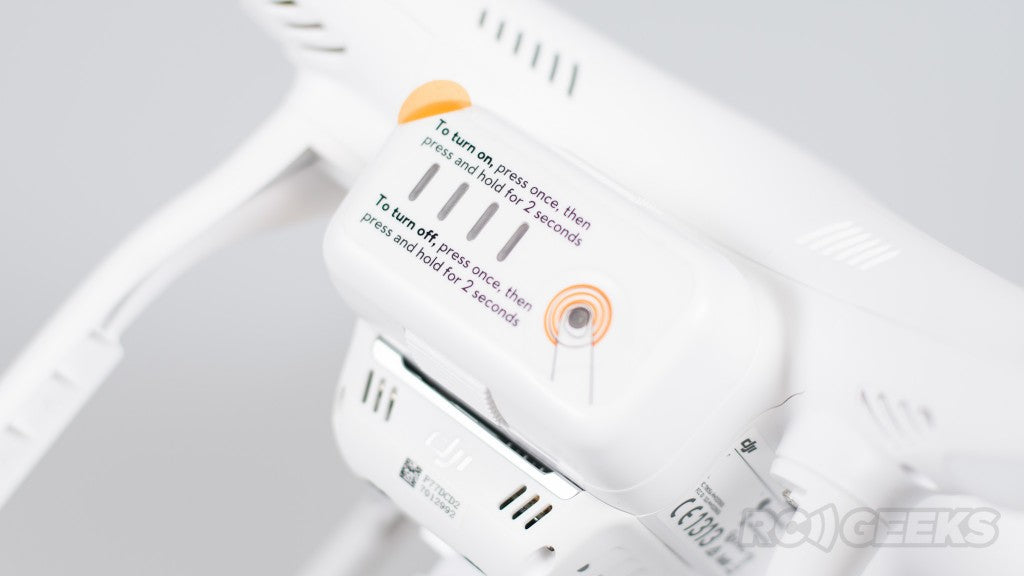 The intelligent battery comes pre-fitted to the craft. To remove it grasp the ribbed areas above and beyond, squeeze them inwards and slide the battery backwards out of its housing.
The intelligent battery comes pre-fitted to the craft. To remove it grasp the ribbed areas above and beyond, squeeze them inwards and slide the battery backwards out of its housing.
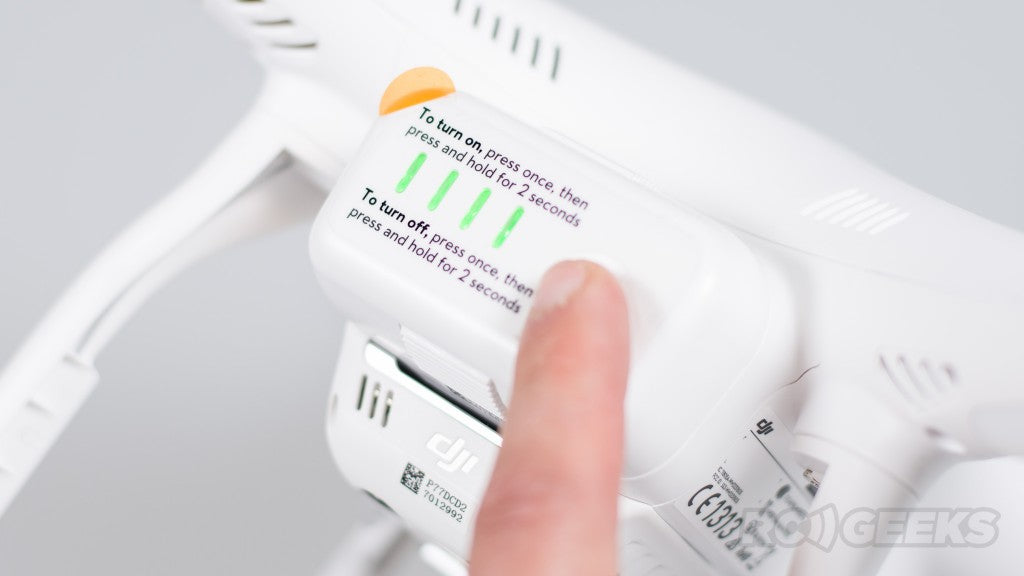 The battery level is indicated by the four LED's on the rear of the battery. These will be lit during flight. The battery level can be checked when the craft is off (or even when the battery is out of the craft) by tapping the battery button.
As per the instruction manual (and the useful in-situ sticker) you power up the craft by pressing and holding the battery button for 2 seconds. We always recommend that your transmitter is powered up before powering up the craft.
The battery level is indicated by the four LED's on the rear of the battery. These will be lit during flight. The battery level can be checked when the craft is off (or even when the battery is out of the craft) by tapping the battery button.
As per the instruction manual (and the useful in-situ sticker) you power up the craft by pressing and holding the battery button for 2 seconds. We always recommend that your transmitter is powered up before powering up the craft.
 Despite looking very similar, the new Phantom 3 battery is NOT compatible with previous models (and vice versa). The electronics now run at 15.2V from this four-cell 4480mAh intelligent LiPo battery. The new battery is reported to offer around 23 minutes of flight time, although this will vary with flight conditions.
Despite looking very similar, the new Phantom 3 battery is NOT compatible with previous models (and vice versa). The electronics now run at 15.2V from this four-cell 4480mAh intelligent LiPo battery. The new battery is reported to offer around 23 minutes of flight time, although this will vary with flight conditions.
Onto the all-new transmitter, removing it from the box it comes folded down wrapped in various bits of plastic film.
 With the film removed, phone holder extended and antennas raised, it looks a little something like this.
With the film removed, phone holder extended and antennas raised, it looks a little something like this.
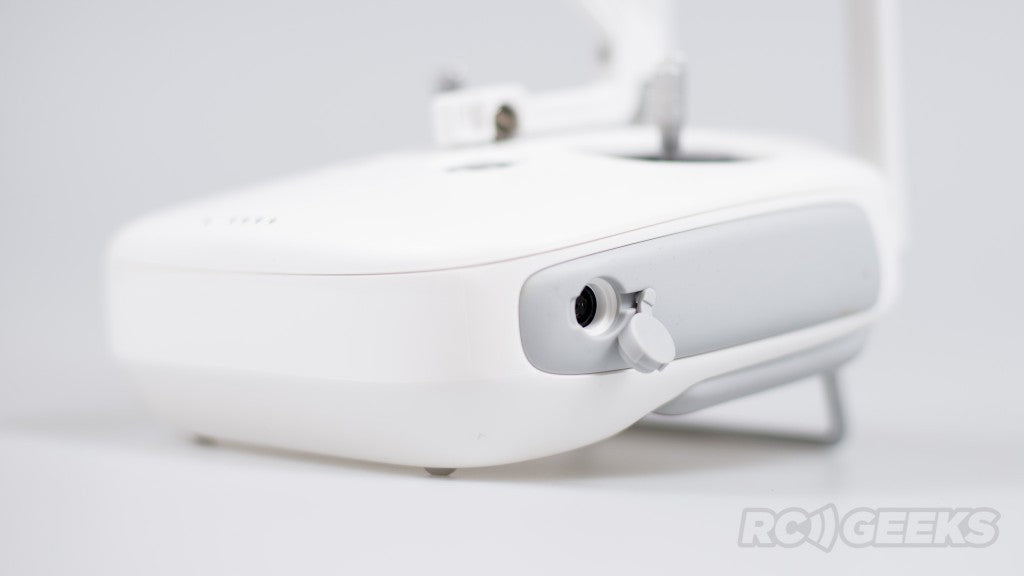 The new GL300A unit borrows heavily from its big brother, the Inspire 1's controller in terms of design and materials. As such it is an expensive unit to replace and we recommend taking good care of it. It features an integrated 6000 mAh 2S LiPo battery with level LED indicators on the leading edge. Turn on the Remote Controller by pressing the power button once, releasing it, and then pressing and holding for 2 seconds
The new GL300A unit borrows heavily from its big brother, the Inspire 1's controller in terms of design and materials. As such it is an expensive unit to replace and we recommend taking good care of it. It features an integrated 6000 mAh 2S LiPo battery with level LED indicators on the leading edge. Turn on the Remote Controller by pressing the power button once, releasing it, and then pressing and holding for 2 seconds
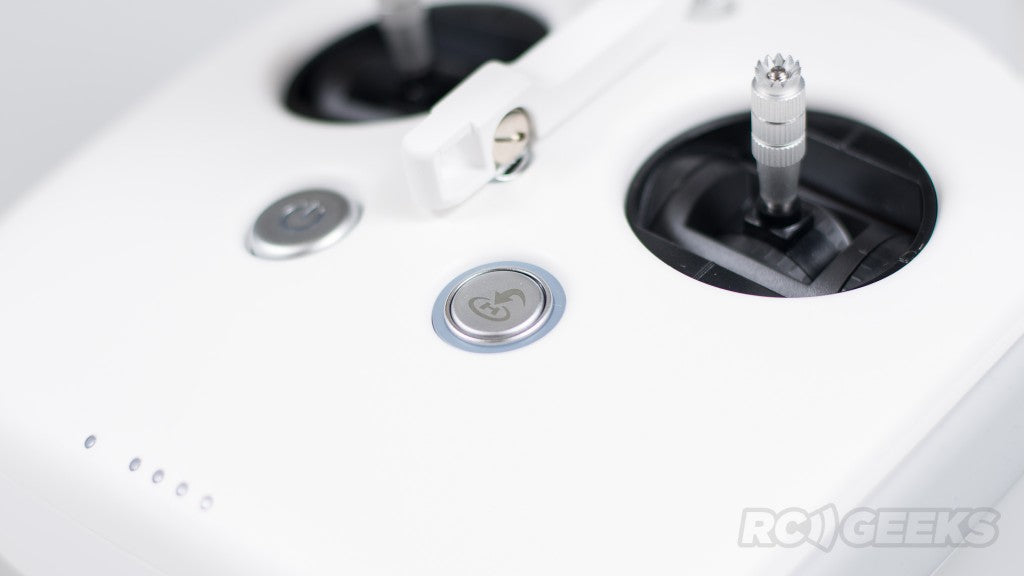 Along with its front mounted power button, the transmitter includes a 'return to home' switch that engages the craft's autopilot, flying the quadcopter back to its launch site and landing it safely.
Along with its front mounted power button, the transmitter includes a 'return to home' switch that engages the craft's autopilot, flying the quadcopter back to its launch site and landing it safely.
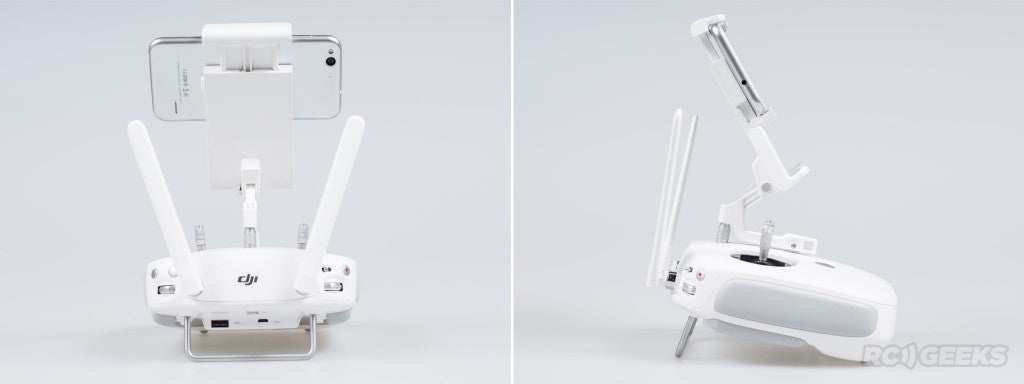 A welcome addition, the transmitter now includes an adjustable smartphone/tablet holder.
A welcome addition, the transmitter now includes an adjustable smartphone/tablet holder.
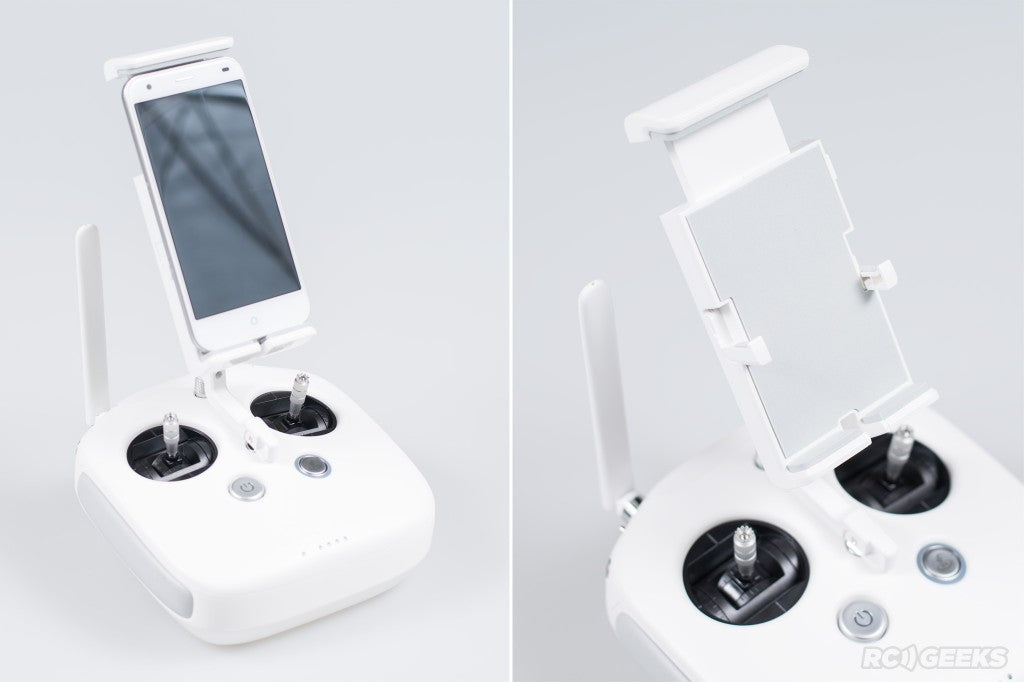 Padded, with kick-out legs for shorter devices, the top is geared to ensure a snug hold of your device. Here a 5.5inch device is shown for scale purposes, as it would not be used in such orientation when flying.
Padded, with kick-out legs for shorter devices, the top is geared to ensure a snug hold of your device. Here a 5.5inch device is shown for scale purposes, as it would not be used in such orientation when flying.
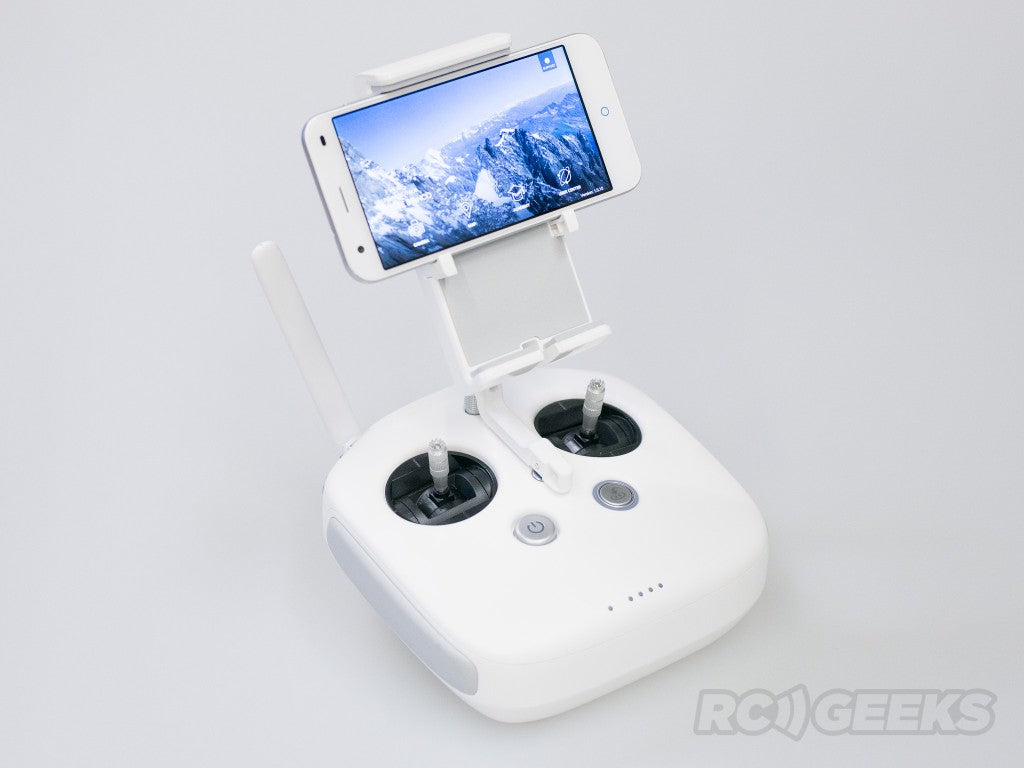 Properly adjusted, the 5.5inch smartphone fits in landscape orientation as such. The DJI pilot app is loaded onto the device via the app store to enable the pilot to receive a HD live view from the craft's onboard camera.
Properly adjusted, the 5.5inch smartphone fits in landscape orientation as such. The DJI pilot app is loaded onto the device via the app store to enable the pilot to receive a HD live view from the craft's onboard camera.
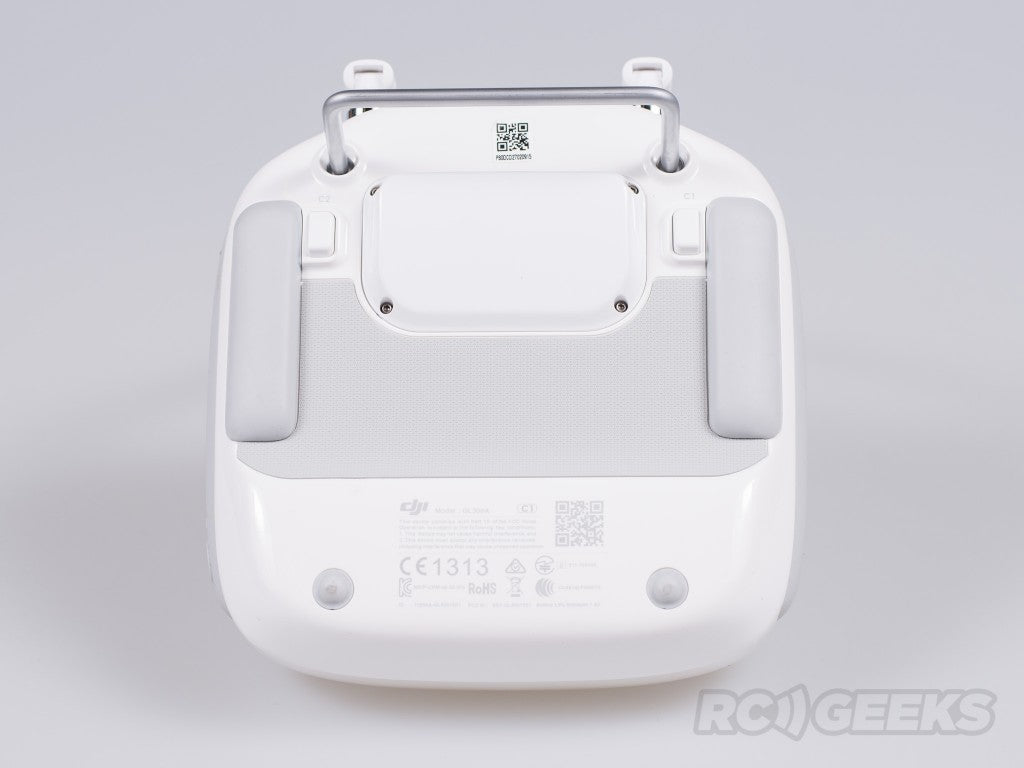 The rear of the transmitter is padded for comfort (and for stability when placed on a smooth surface) has two configurable C1 & C2 buttons and a metal hanger.
The rear of the transmitter is padded for comfort (and for stability when placed on a smooth surface) has two configurable C1 & C2 buttons and a metal hanger.
 At the top of the rear are two USB ports. The standard USB port is used for updating the firmware of the transmitter, whilst the smaller Micro USB port is used to connect a smartphone or tablet to it and provide the information to the DJI Pilot App.
At the top of the rear are two USB ports. The standard USB port is used for updating the firmware of the transmitter, whilst the smaller Micro USB port is used to connect a smartphone or tablet to it and provide the information to the DJI Pilot App.
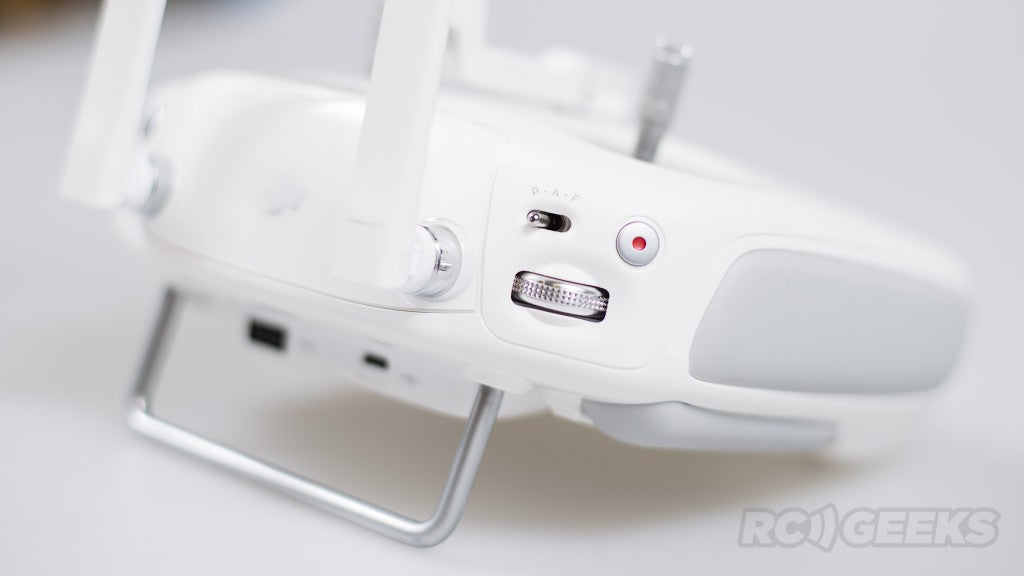 The shoulders of the transmitter feature a series of dials and switches for controlling the Phantom 3's camera. The left side dial controls the tilt-angle at which the camera is pointing, whilst the right hand side adjusts camera values. Camera shutter, video recording and playback buttons border these.
Lastly the P-A-F mode toggle switches between flight modes. For more in-depth information on these modes, please see page 26 of the user manual.
The shoulders of the transmitter feature a series of dials and switches for controlling the Phantom 3's camera. The left side dial controls the tilt-angle at which the camera is pointing, whilst the right hand side adjusts camera values. Camera shutter, video recording and playback buttons border these.
Lastly the P-A-F mode toggle switches between flight modes. For more in-depth information on these modes, please see page 26 of the user manual.
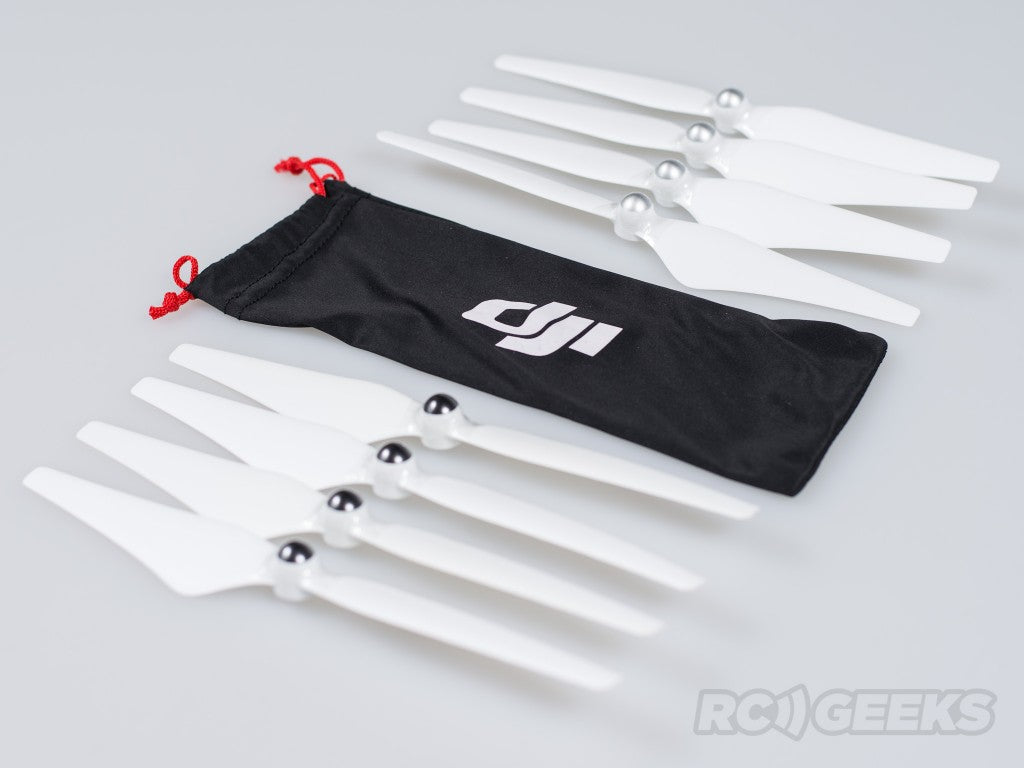 Back to the package and a look at the propellers. As with previous Phantom's both the Professional and the Advanced come with two full sets of plastic props, now held in a soft drawstring bag.
Back to the package and a look at the propellers. As with previous Phantom's both the Professional and the Advanced come with two full sets of plastic props, now held in a soft drawstring bag.
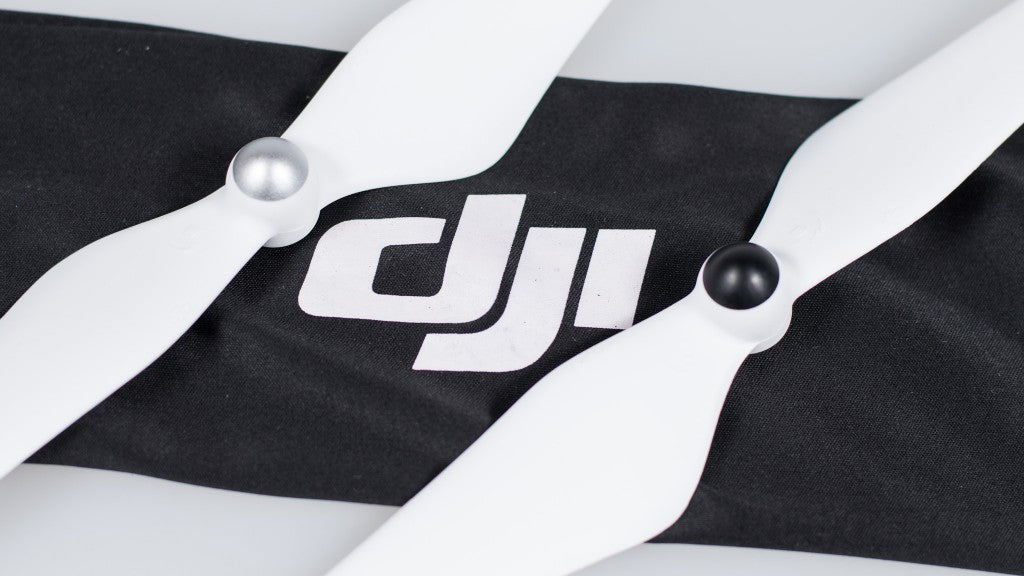 The craft is fitted with a pair of black cone and a pair of silver cone propellers, matched up with the motor markings. Should these markings ever become worn, pay attention to the direction-of-rotation markers on each arm by the motors.
The craft is fitted with a pair of black cone and a pair of silver cone propellers, matched up with the motor markings. Should these markings ever become worn, pay attention to the direction-of-rotation markers on each arm by the motors.
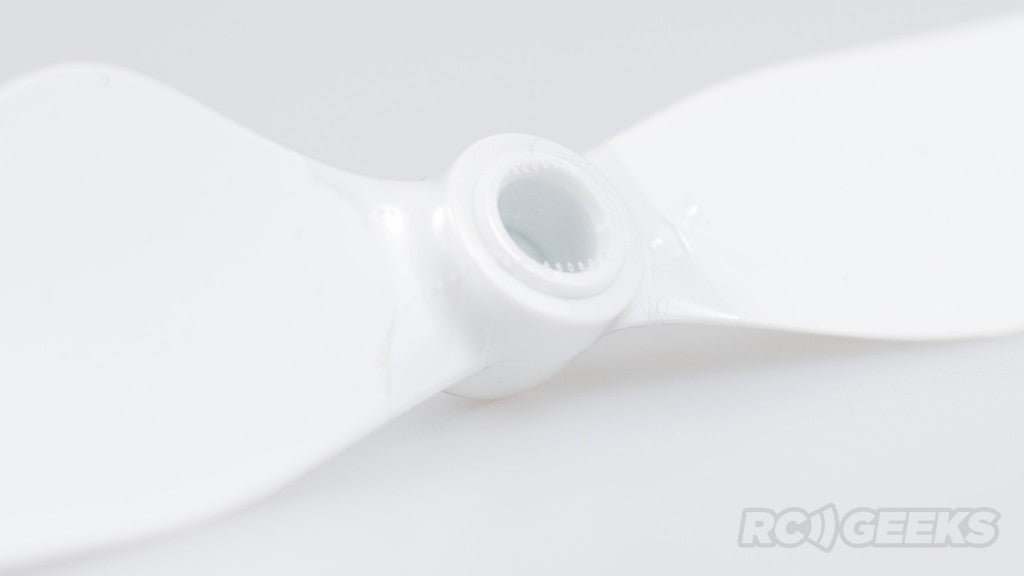 The Phantom 3 propellers now come individually 'sealed' with plastic protecting the threads. Its worth noting that the threads on our propellers were plastic as opposed to the metal ones of previous DJI drones.
The Phantom 3 propellers now come individually 'sealed' with plastic protecting the threads. Its worth noting that the threads on our propellers were plastic as opposed to the metal ones of previous DJI drones.
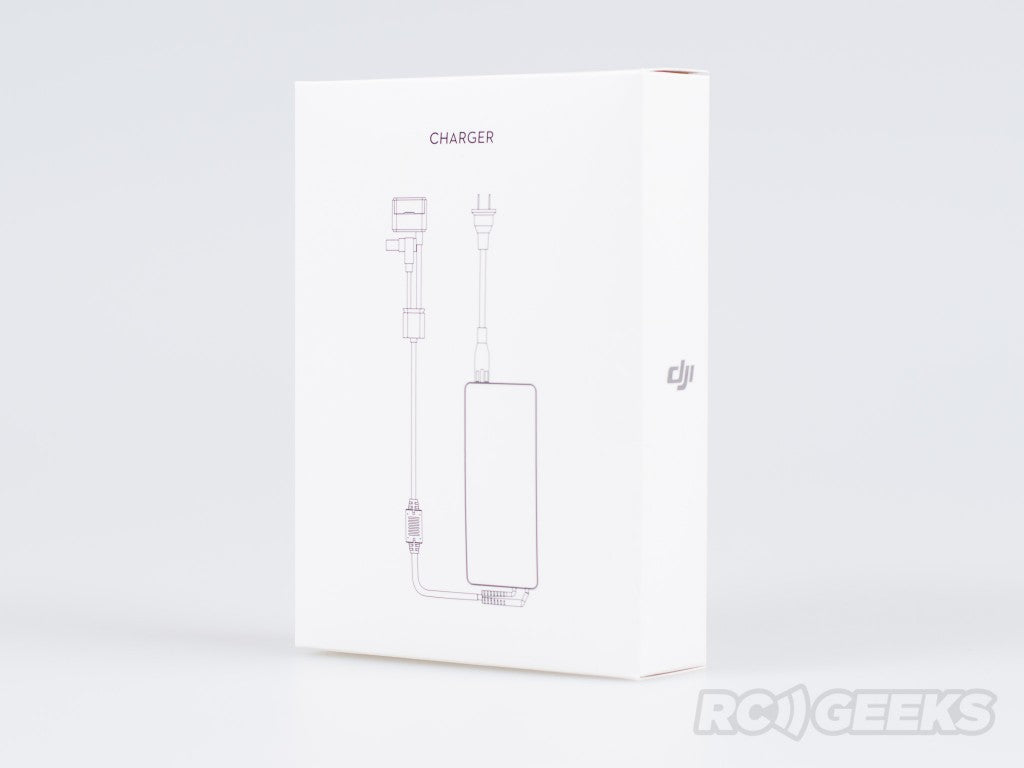 The large box towards the front of the box, contains the charging cables.
The large box towards the front of the box, contains the charging cables.
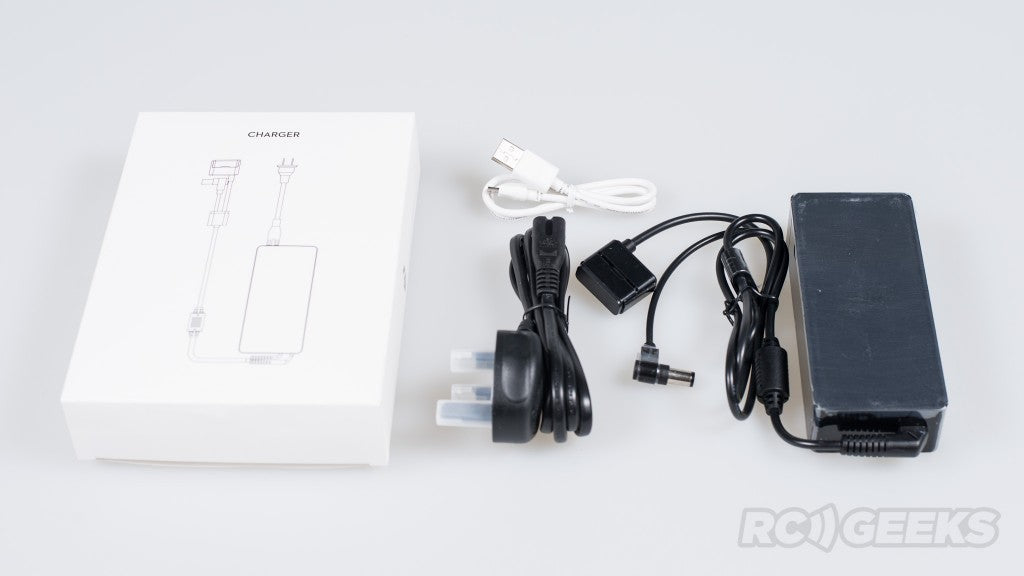 The Phantom 3 Professional charging kit out of the box includes UK plug adapter, Micro USB cable and the twin-charger itself.
The Phantom 3 Professional charging kit out of the box includes UK plug adapter, Micro USB cable and the twin-charger itself.
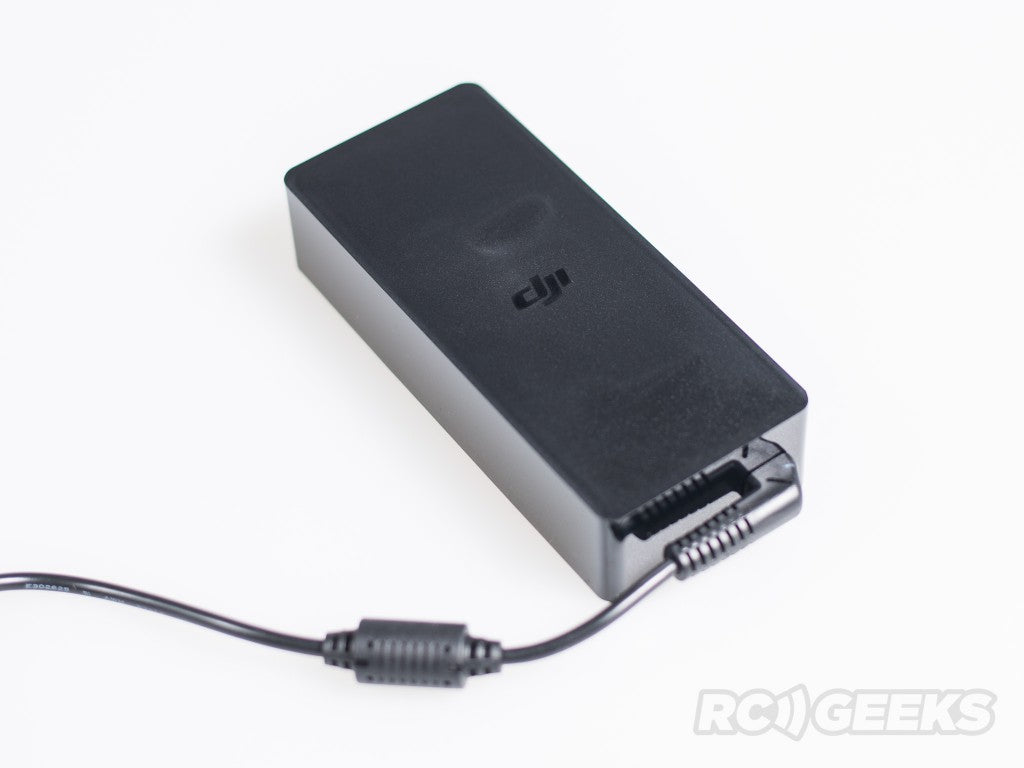 The Phantom 3 is available with one of two chargers. A 57W charger for the Advanced and this, the 100W charger for the Professional. Both are rated at 17.4 V and are inter-changable with the Professional charger capable of recharging faster (reportedly under 30 minutes).
The Phantom 3 is available with one of two chargers. A 57W charger for the Advanced and this, the 100W charger for the Professional. Both are rated at 17.4 V and are inter-changable with the Professional charger capable of recharging faster (reportedly under 30 minutes).
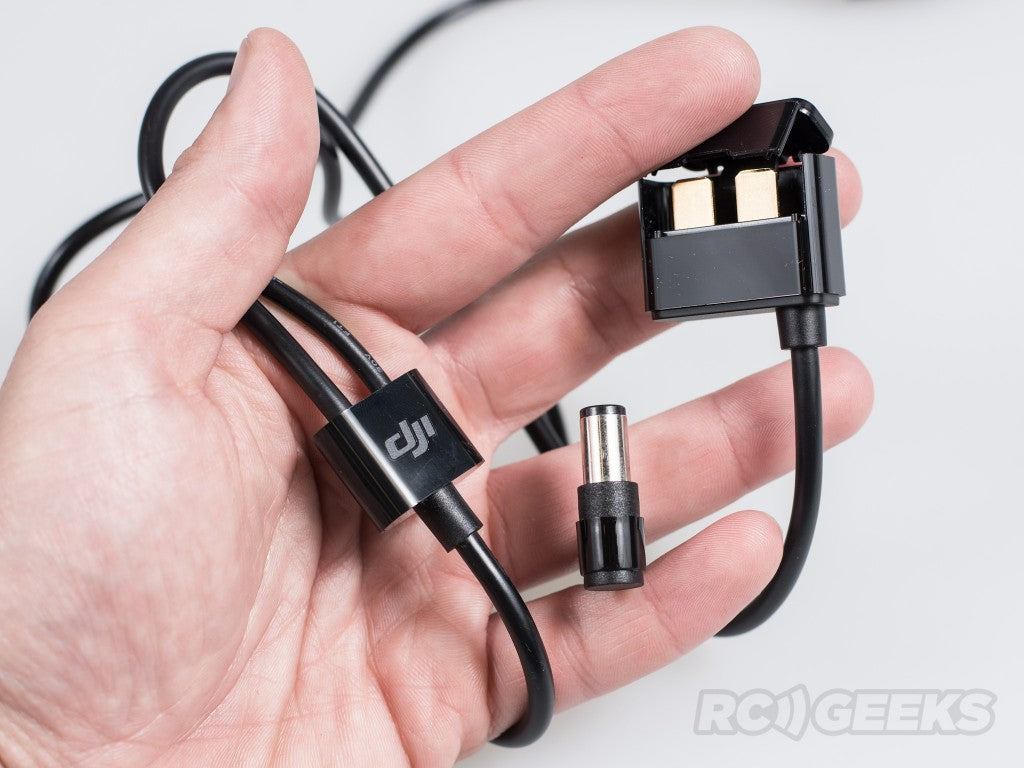 For ease, DJI have integrated the charger for the craft and the transmitter into one brick. Sadly they do not suggest you charge both devices at the same time. The two connectors for the transmitter and the battery are seen above.
For ease, DJI have integrated the charger for the craft and the transmitter into one brick. Sadly they do not suggest you charge both devices at the same time. The two connectors for the transmitter and the battery are seen above.
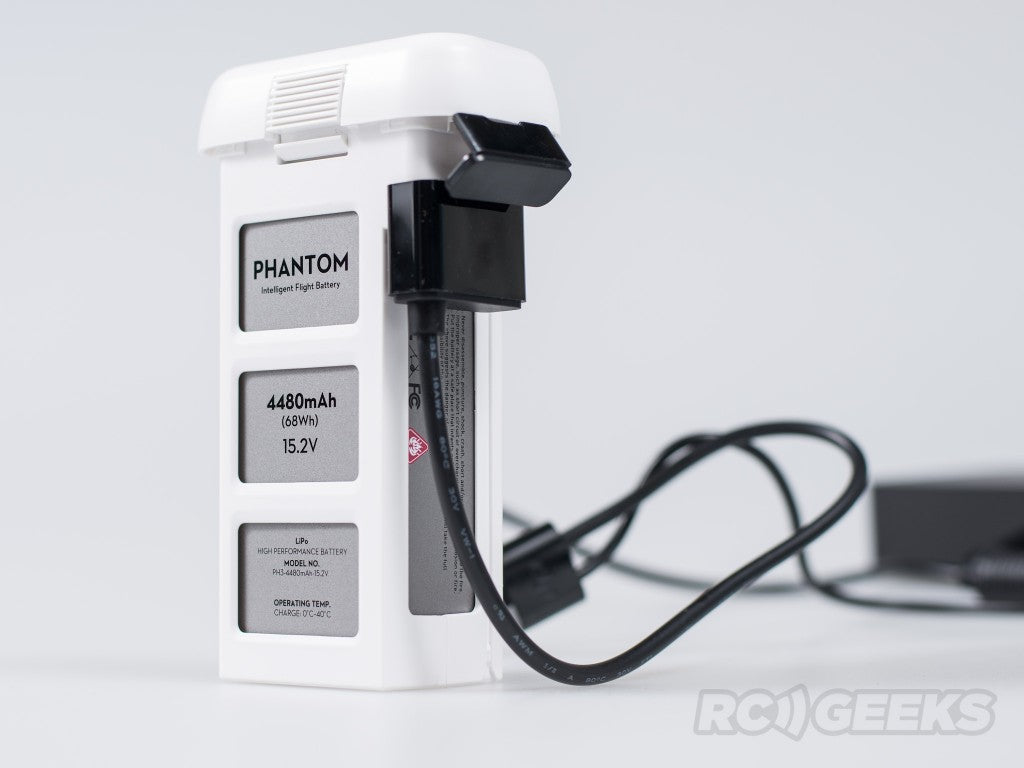 The battery connector simply slides into the twin slots under the lip of the battery edge. The LED's on top will give you feedback as the battery charges.
The battery connector simply slides into the twin slots under the lip of the battery edge. The LED's on top will give you feedback as the battery charges.
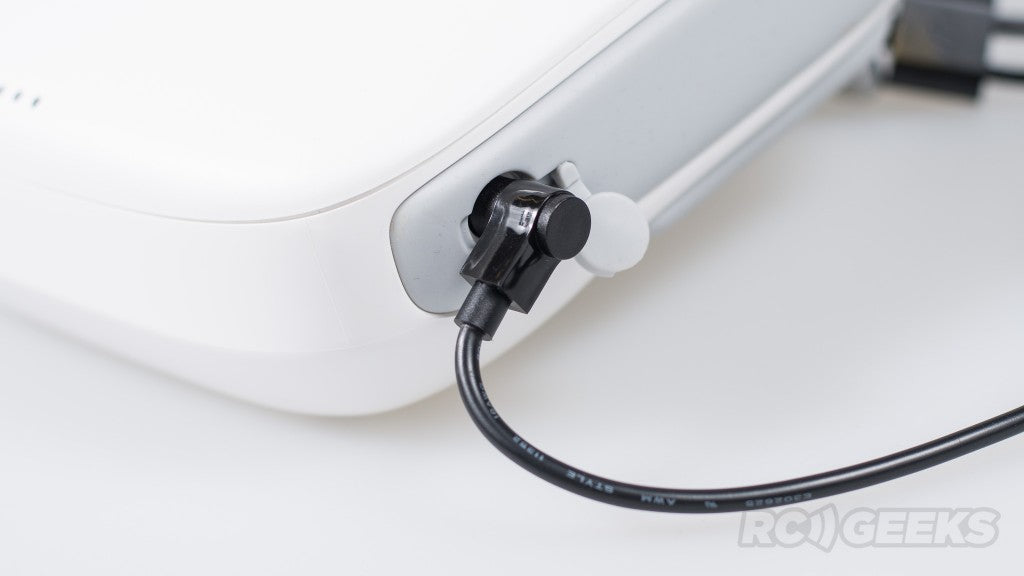 The transmitter power port is on the right-hand-side of the transmitter, under a rubber bung.
The transmitter power port is on the right-hand-side of the transmitter, under a rubber bung.
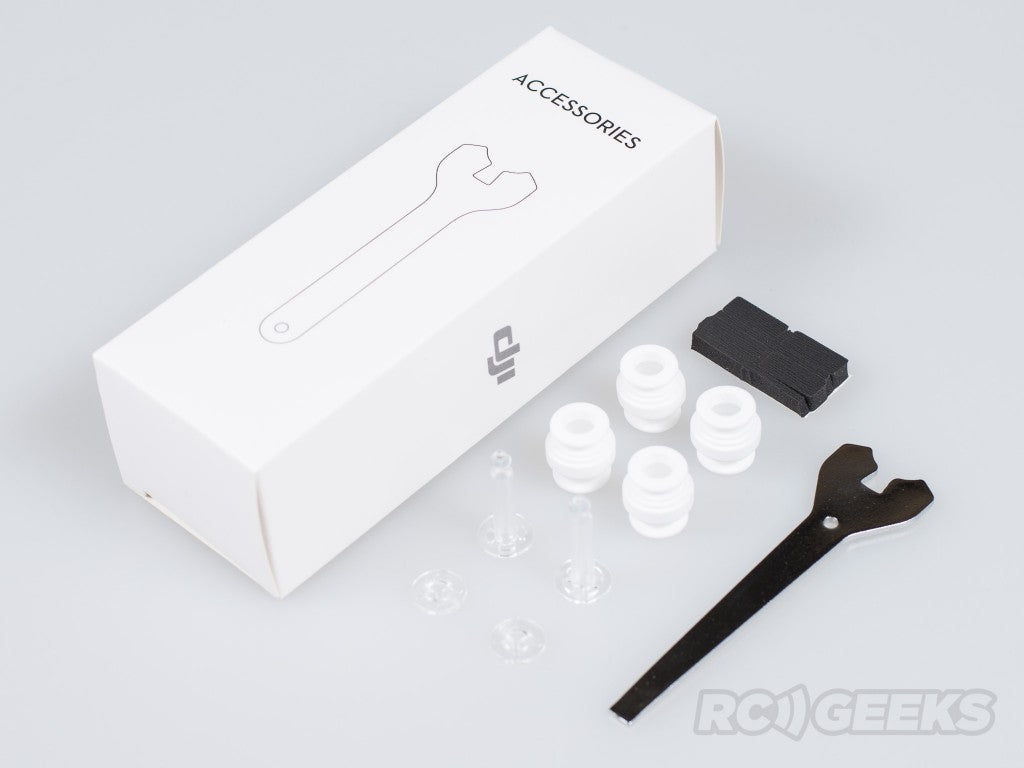 The final piece of the package is the accessories box. This contains a range of potential consumables the craft may go through. Four foam pads for the landing gear, four gimbal shock-absorbers and two anti-drop mounts. Should you ever find one of your propellers jammed on, they have also included a prop spanner, designed to hold the motor in place whilst you undo the rotor with some torque.
The final piece of the package is the accessories box. This contains a range of potential consumables the craft may go through. Four foam pads for the landing gear, four gimbal shock-absorbers and two anti-drop mounts. Should you ever find one of your propellers jammed on, they have also included a prop spanner, designed to hold the motor in place whilst you undo the rotor with some torque.
 The final complete setup, free of its packaging and laid out on the table.
The final complete setup, free of its packaging and laid out on the table.
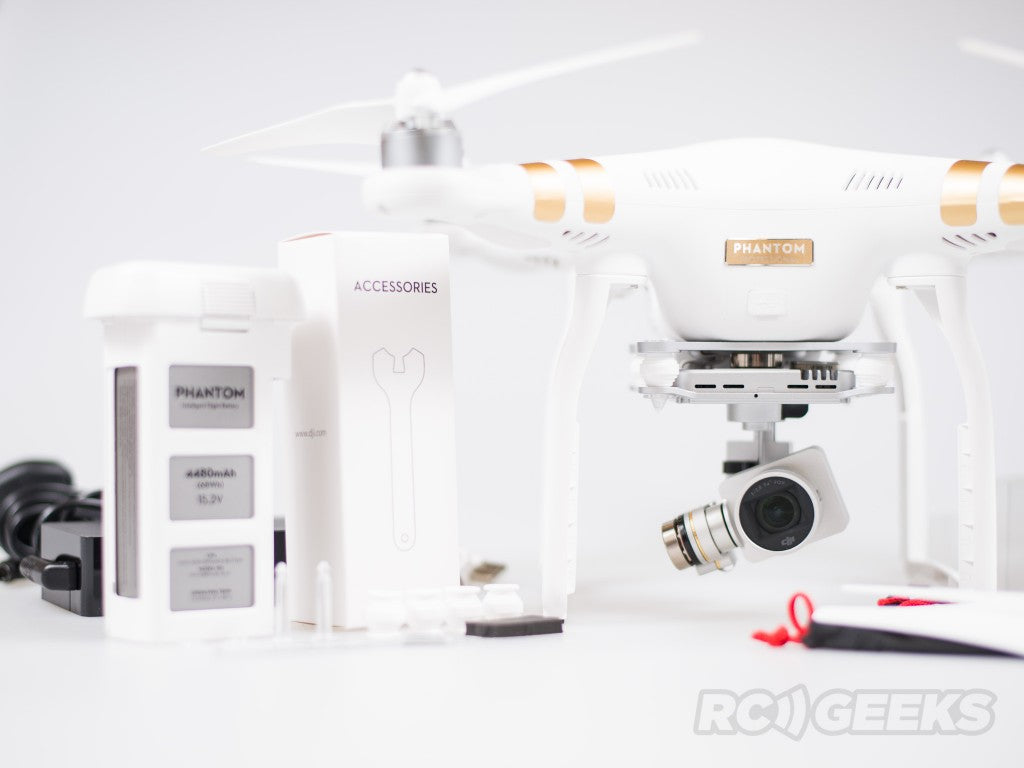 In this third iteration of Phantom, DJI have put together a fully featured and highly capable kit at a very reasonable price point.
In this third iteration of Phantom, DJI have put together a fully featured and highly capable kit at a very reasonable price point.
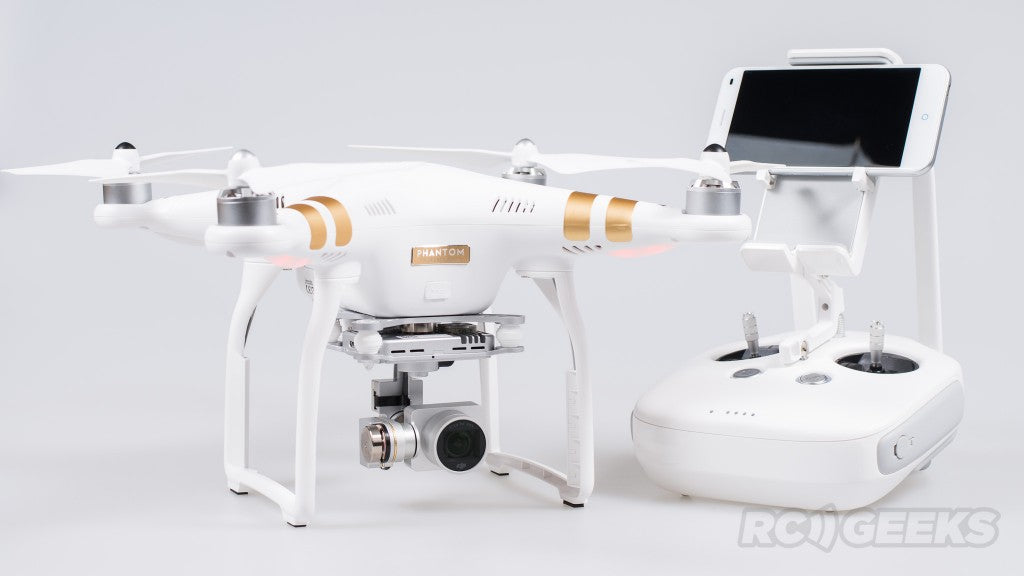 The only thing you need provide is a modern smartphone. The DJI Pilot app is only compatible with devices running iOS 8.0 or later or Android v4.1.2 or later. DJI list a range of devices that will work with the Phantom 3 on their FAQ page.
The only thing you need provide is a modern smartphone. The DJI Pilot app is only compatible with devices running iOS 8.0 or later or Android v4.1.2 or later. DJI list a range of devices that will work with the Phantom 3 on their FAQ page.
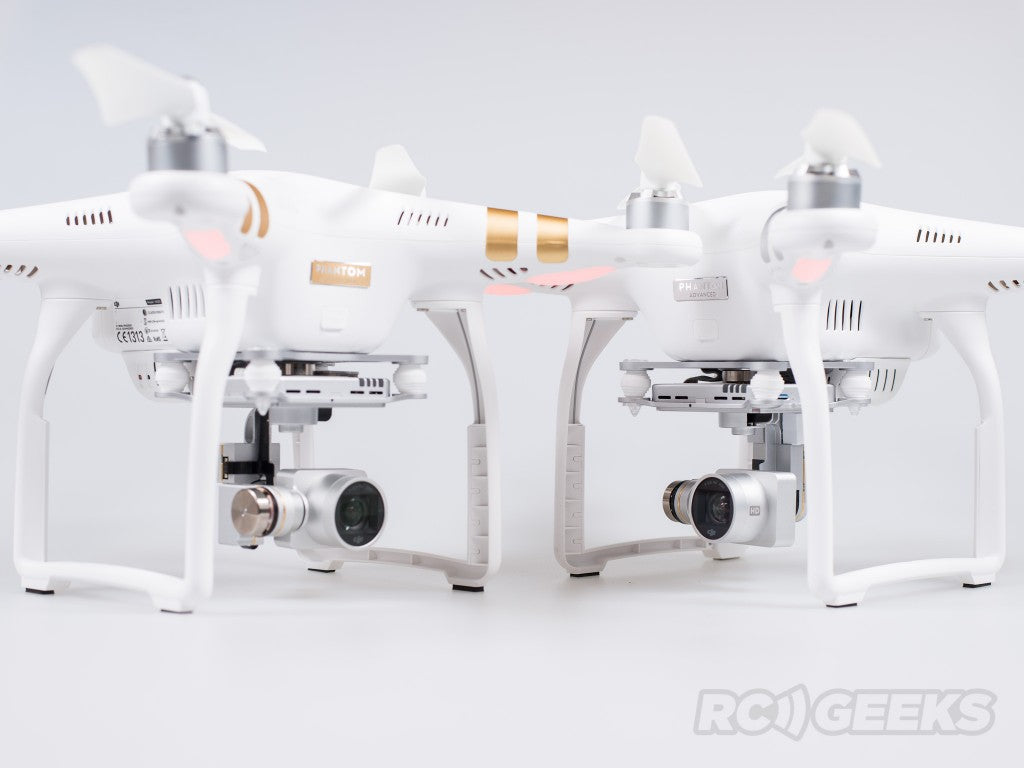 With props on and battery in, the Phantom 3 Professional and its sibling, the Phantom 3 Advanced weigh in at 1280g
With props on and battery in, the Phantom 3 Professional and its sibling, the Phantom 3 Advanced weigh in at 1280g

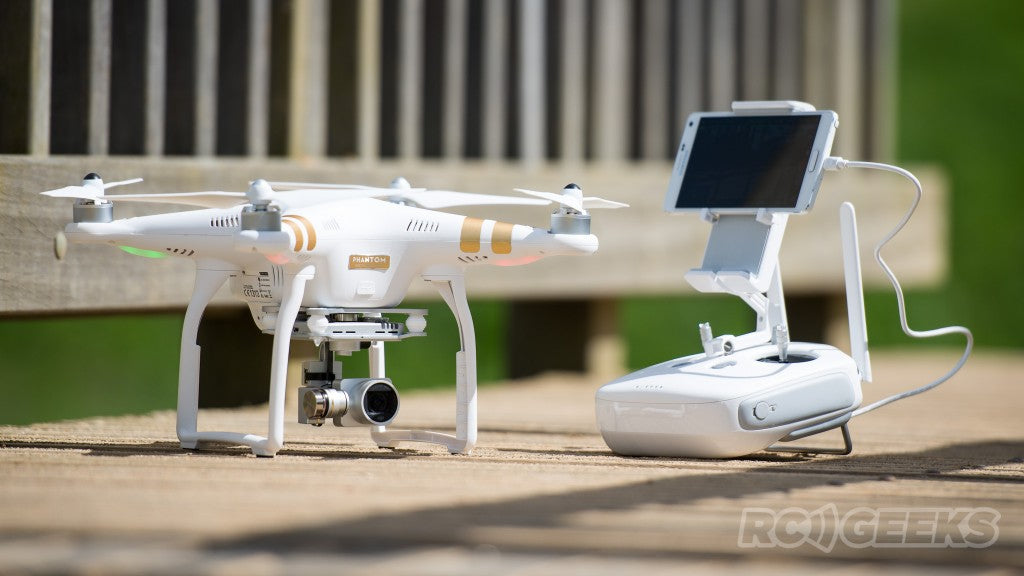 Our experienced test pilot confirmed that the new technologies employed in the Phantom 3 really make it stable and secure to fly, even in the strong winds we have been experiencing.
Our experienced test pilot confirmed that the new technologies employed in the Phantom 3 really make it stable and secure to fly, even in the strong winds we have been experiencing.
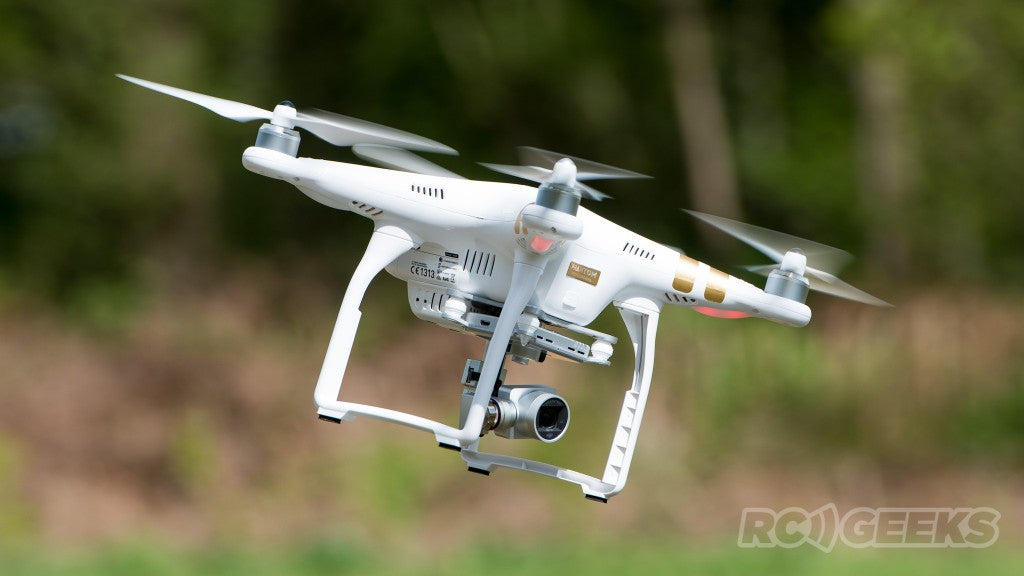 As with the Phantom 2 Vision Plus we hope to capture some test footage in the coming weeks to demonstrate the potential of the new craft and it's fantastic camera.
As with the Phantom 2 Vision Plus we hope to capture some test footage in the coming weeks to demonstrate the potential of the new craft and it's fantastic camera.
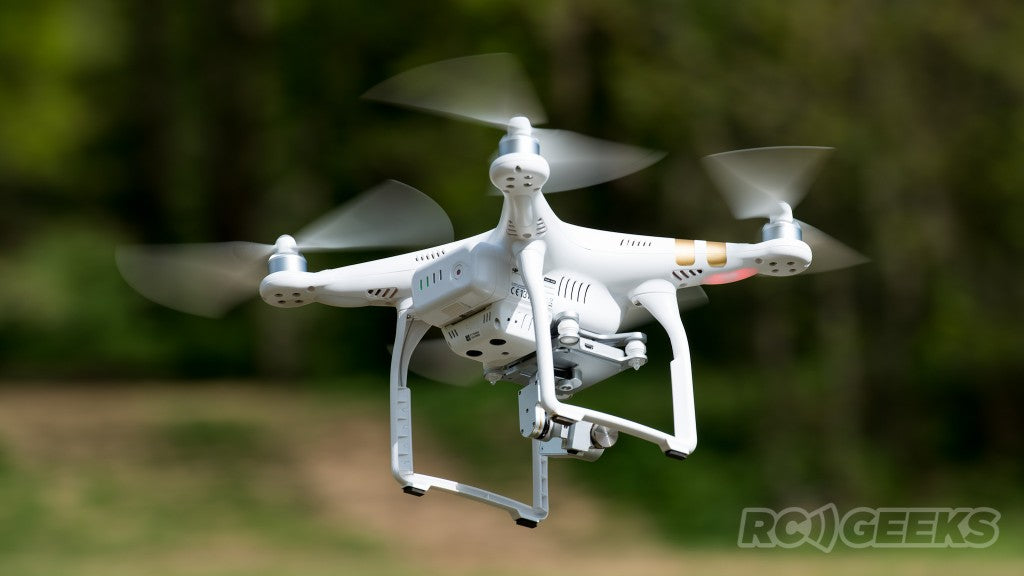 For now, if you have any queries regarding the unboxing of the Phantom 3 please leave your comments below. Should you have any queries or wish for some pointers regarding a Phantom 3 you have purchased from us, please get in touch here.
For now, if you have any queries regarding the unboxing of the Phantom 3 please leave your comments below. Should you have any queries or wish for some pointers regarding a Phantom 3 you have purchased from us, please get in touch here.
 Although we have had our hands on potentially pre-production units at the recent DJI launch; we have waited for this, the retail model to arrive to ensure this unboxing experience would mirror your own.
Although we have had our hands on potentially pre-production units at the recent DJI launch; we have waited for this, the retail model to arrive to ensure this unboxing experience would mirror your own.
The Outer Box
 Lets take a closer look at the new package. Measuring 365 x 210 x 390mm and weighing in at 4.2kg, it is taller, narrower and lighter than the outgoing Phantom 2 Vision Plus v3.0 box.
Lets take a closer look at the new package. Measuring 365 x 210 x 390mm and weighing in at 4.2kg, it is taller, narrower and lighter than the outgoing Phantom 2 Vision Plus v3.0 box.
 The gold stickers and plaque highlight the professional edition as the new top-of-the-line model.
The gold stickers and plaque highlight the professional edition as the new top-of-the-line model.

New Features
New icons hint at the new vision positioning and lightbridge features within. The magic words we have been waiting for; 4K video @30fps, 1080p video at 60fps and a 12 Megapixel camera that can produce Adobe DNG Raw files.
The magic words we have been waiting for; 4K video @30fps, 1080p video at 60fps and a 12 Megapixel camera that can produce Adobe DNG Raw files.

Inside The Box
The new serial number panel (here blurred out, but worth mentioning), if you do decide to discard the packaging, we recommend you keep this part of the box safe. Upon opening the large flap, one of the first things you are presented with is a leaflet from the Civil Aviation Authority.
Upon opening the large flap, one of the first things you are presented with is a leaflet from the Civil Aviation Authority.
 This short flyer gives you a primer into the legalities of piloting a quadcopter in the UK and is in our opinion a great touch. Its good to see that DJI are working with the CAA to educate consumers, hopefully protecting the future of the hobby for us all.
This short flyer gives you a primer into the legalities of piloting a quadcopter in the UK and is in our opinion a great touch. Its good to see that DJI are working with the CAA to educate consumers, hopefully protecting the future of the hobby for us all.
 Alongside the flyer, on-top of the familiar 'egg-box' packaging, is the manual bookpack.
Alongside the flyer, on-top of the familiar 'egg-box' packaging, is the manual bookpack.
 This contains the quick start guide, safety guideline and disclaimer leaflet, a pamphlet on the intelligent flight battery, a range of arm stickers and also a 'in the box' contents card.
This contains the quick start guide, safety guideline and disclaimer leaflet, a pamphlet on the intelligent flight battery, a range of arm stickers and also a 'in the box' contents card.
 If you would like a closer look at any of these, they are all available in digital format on the DJI downloads page (which is also where you will find the latest firmware updates).
If you would like a closer look at any of these, they are all available in digital format on the DJI downloads page (which is also where you will find the latest firmware updates).
Stickers And More Stickers
 Phantom 3 Professional's come with 5 different sets of stickers. Matte metallic silver and gold (as found as standard on the Advanced and Professional) and gloss metallic red, purple and blue sets.
Phantom 3 Professional's come with 5 different sets of stickers. Matte metallic silver and gold (as found as standard on the Advanced and Professional) and gloss metallic red, purple and blue sets.
 The above shot hopefully gives you a better feel for the finish of the two sets.
The above shot hopefully gives you a better feel for the finish of the two sets.
 With the egg-box lid removed, we are presented with the familiar Phantom silhouette surrounded by its new accessories.
With the egg-box lid removed, we are presented with the familiar Phantom silhouette surrounded by its new accessories.

Out Of the Box
The craft comes fully built and bound with only the propellers requiring attachment.
 The individual elements free'd from their protective carton. The craft itself is bordered by the propeller pouch, the all-new transmitter, the charger and also an accessories box.
The individual elements free'd from their protective carton. The craft itself is bordered by the propeller pouch, the all-new transmitter, the charger and also an accessories box.

What's New?
We will start with the craft itself, here shown from all four angles with the transit packaging still intact. As per the Phantom 2, its diagonal size (including propellers) is 590 mm. The Phantom 3 Professional has a gold placard badging it as such on the front of the body. Differing from the 'Phantom 4k' as seen on others, potentially pre-release or non-UK market models elsewhere on the internet.
The Phantom 3 Professional has a gold placard badging it as such on the front of the body. Differing from the 'Phantom 4k' as seen on others, potentially pre-release or non-UK market models elsewhere on the internet.

New Camera
This the Professional Edition comes with the 4K camera. Both models feature the 94° 20 mm (35 mm format equivalent) f/2.8 lens which has a more natural field of view compared to cameras of the past. The camera will provide 12MP still photos in JPEG or DNG formats. In video mode it produces MP4 or MOV formats (utilising MPEG-4 AVC/H.264 codecs). For full details, please see the DJI specification page. DJI have done away with the lens cap found on the Vision Plus. Out of the box the new larger lens has a protective film you should remove.
DJI have done away with the lens cap found on the Vision Plus. Out of the box the new larger lens has a protective film you should remove.
 The 3-axis brushless gimbal is all new, resisting the motion of the craft (and removing the effects of turbulence and vibration from the picture) whilst allowing the camera to Pitch -90° to +30° from horizontal via the transmitter.
We recommend holding onto the gimbal clip and replacing it when the craft is not in use. It will ensure the camera is supported in place on the gimbal, protecting it and it's brushless motors from flapping around.
The 3-axis brushless gimbal is all new, resisting the motion of the craft (and removing the effects of turbulence and vibration from the picture) whilst allowing the camera to Pitch -90° to +30° from horizontal via the transmitter.
We recommend holding onto the gimbal clip and replacing it when the craft is not in use. It will ensure the camera is supported in place on the gimbal, protecting it and it's brushless motors from flapping around.
 Remove the gimbal clamp by sliding it to the right (when facing the nose of the aircraft), as shown above
Remove the gimbal clamp by sliding it to the right (when facing the nose of the aircraft), as shown above
 The Phantom 3 also has a foam support section in the back of its special 3-axis brushless gimbal, which also needs to be removed before flight.
The Phantom 3 also has a foam support section in the back of its special 3-axis brushless gimbal, which also needs to be removed before flight.
 Placing the craft upside-down on a table makes it easy for this to be pinched and carefully removed. Here we can also see the new optical-flow sensor panel. Twin ultrasonic sensors and a camera aid the flight controller in keeping the craft steady by constantly taking readings from the ground below (between 3m and 30cm).
This alongside twin satellite positioning systems (GPS and now also GLONASS) promise some solid flight characteristics.
Placing the craft upside-down on a table makes it easy for this to be pinched and carefully removed. Here we can also see the new optical-flow sensor panel. Twin ultrasonic sensors and a camera aid the flight controller in keeping the craft steady by constantly taking readings from the ground below (between 3m and 30cm).
This alongside twin satellite positioning systems (GPS and now also GLONASS) promise some solid flight characteristics. The Phantom 3's motors are labelled with dots to aid the attachment of the propellers. You will note that two opposing motors have silver dots on-top of the threads, whilst the other two motors have black dots on-top of the threads. Remove the yellow stickers (no longer cards) on-top of the motors before attaching the propellers.
The Phantom 3's motors are labelled with dots to aid the attachment of the propellers. You will note that two opposing motors have silver dots on-top of the threads, whilst the other two motors have black dots on-top of the threads. Remove the yellow stickers (no longer cards) on-top of the motors before attaching the propellers.
 Its extremely important to ensure you match the propeller cone tip colour to the motors tip colour before starting the craft. The silver cone'd propellers tighten in a clockwise fashion, whilst the black cone'd propellers tighten in an anti-clockwise fashion. If you are unsure, please refer to the manual or even give us a call to check. We recommend only hand-tightening the propellers onto the motors.
Its extremely important to ensure you match the propeller cone tip colour to the motors tip colour before starting the craft. The silver cone'd propellers tighten in a clockwise fashion, whilst the black cone'd propellers tighten in an anti-clockwise fashion. If you are unsure, please refer to the manual or even give us a call to check. We recommend only hand-tightening the propellers onto the motors.
A Better Camera Requires Bigger Storage
 The Phantom 3 comes bundled with a 16GB Lexar 633x UHS-1 (ultra high speed 1) MicroSD card. The largest memory-size the craft can currently handle is 64GB. The included card is more than capable of recording the 23 minutes of 4K footage you could produce on a single battery.
The card comes pre-installed. To remove it simply push it 'into' the gimbal base and it should spring back and pop-out slightly. If you do not have a microSD card reader, you can plug the included micro-USB cable into the opposite side of the gimbal base and use the craft to download images to your computer.
The Phantom 3 comes bundled with a 16GB Lexar 633x UHS-1 (ultra high speed 1) MicroSD card. The largest memory-size the craft can currently handle is 64GB. The included card is more than capable of recording the 23 minutes of 4K footage you could produce on a single battery.
The card comes pre-installed. To remove it simply push it 'into' the gimbal base and it should spring back and pop-out slightly. If you do not have a microSD card reader, you can plug the included micro-USB cable into the opposite side of the gimbal base and use the craft to download images to your computer.
 The Phantom 3 has a revised landing gear, now slightly wider in footprint. Each of the legs now contains a patch antenna to support the new massive 2km range. The rear right leg has the compass in its lower section.
The Phantom 3 has a revised landing gear, now slightly wider in footprint. Each of the legs now contains a patch antenna to support the new massive 2km range. The rear right leg has the compass in its lower section.
 As with previous models, the craft has a micro-usb port for connecting the craft to your computer. Flight data is automatically recorded to the internal storage of the aircraft. This includes flight telemetry, aircraft status information and other parameters. Connect your craft to your computer (after removing the propellers) to gain access to this information.
As with previous models, the craft has a micro-usb port for connecting the craft to your computer. Flight data is automatically recorded to the internal storage of the aircraft. This includes flight telemetry, aircraft status information and other parameters. Connect your craft to your computer (after removing the propellers) to gain access to this information.
Revised Intelligent Battery
 The intelligent battery comes pre-fitted to the craft. To remove it grasp the ribbed areas above and beyond, squeeze them inwards and slide the battery backwards out of its housing.
The intelligent battery comes pre-fitted to the craft. To remove it grasp the ribbed areas above and beyond, squeeze them inwards and slide the battery backwards out of its housing.
 The battery level is indicated by the four LED's on the rear of the battery. These will be lit during flight. The battery level can be checked when the craft is off (or even when the battery is out of the craft) by tapping the battery button.
As per the instruction manual (and the useful in-situ sticker) you power up the craft by pressing and holding the battery button for 2 seconds. We always recommend that your transmitter is powered up before powering up the craft.
The battery level is indicated by the four LED's on the rear of the battery. These will be lit during flight. The battery level can be checked when the craft is off (or even when the battery is out of the craft) by tapping the battery button.
As per the instruction manual (and the useful in-situ sticker) you power up the craft by pressing and holding the battery button for 2 seconds. We always recommend that your transmitter is powered up before powering up the craft.
 Despite looking very similar, the new Phantom 3 battery is NOT compatible with previous models (and vice versa). The electronics now run at 15.2V from this four-cell 4480mAh intelligent LiPo battery. The new battery is reported to offer around 23 minutes of flight time, although this will vary with flight conditions.
Despite looking very similar, the new Phantom 3 battery is NOT compatible with previous models (and vice versa). The electronics now run at 15.2V from this four-cell 4480mAh intelligent LiPo battery. The new battery is reported to offer around 23 minutes of flight time, although this will vary with flight conditions.
All-New Transmitter
 With the film removed, phone holder extended and antennas raised, it looks a little something like this.
With the film removed, phone holder extended and antennas raised, it looks a little something like this.
 The new GL300A unit borrows heavily from its big brother, the Inspire 1's controller in terms of design and materials. As such it is an expensive unit to replace and we recommend taking good care of it. It features an integrated 6000 mAh 2S LiPo battery with level LED indicators on the leading edge. Turn on the Remote Controller by pressing the power button once, releasing it, and then pressing and holding for 2 seconds
The new GL300A unit borrows heavily from its big brother, the Inspire 1's controller in terms of design and materials. As such it is an expensive unit to replace and we recommend taking good care of it. It features an integrated 6000 mAh 2S LiPo battery with level LED indicators on the leading edge. Turn on the Remote Controller by pressing the power button once, releasing it, and then pressing and holding for 2 seconds
 Along with its front mounted power button, the transmitter includes a 'return to home' switch that engages the craft's autopilot, flying the quadcopter back to its launch site and landing it safely.
Along with its front mounted power button, the transmitter includes a 'return to home' switch that engages the craft's autopilot, flying the quadcopter back to its launch site and landing it safely.
 A welcome addition, the transmitter now includes an adjustable smartphone/tablet holder.
A welcome addition, the transmitter now includes an adjustable smartphone/tablet holder.
 Padded, with kick-out legs for shorter devices, the top is geared to ensure a snug hold of your device. Here a 5.5inch device is shown for scale purposes, as it would not be used in such orientation when flying.
Padded, with kick-out legs for shorter devices, the top is geared to ensure a snug hold of your device. Here a 5.5inch device is shown for scale purposes, as it would not be used in such orientation when flying.
 Properly adjusted, the 5.5inch smartphone fits in landscape orientation as such. The DJI pilot app is loaded onto the device via the app store to enable the pilot to receive a HD live view from the craft's onboard camera.
Properly adjusted, the 5.5inch smartphone fits in landscape orientation as such. The DJI pilot app is loaded onto the device via the app store to enable the pilot to receive a HD live view from the craft's onboard camera.
 The rear of the transmitter is padded for comfort (and for stability when placed on a smooth surface) has two configurable C1 & C2 buttons and a metal hanger.
The rear of the transmitter is padded for comfort (and for stability when placed on a smooth surface) has two configurable C1 & C2 buttons and a metal hanger.
 At the top of the rear are two USB ports. The standard USB port is used for updating the firmware of the transmitter, whilst the smaller Micro USB port is used to connect a smartphone or tablet to it and provide the information to the DJI Pilot App.
At the top of the rear are two USB ports. The standard USB port is used for updating the firmware of the transmitter, whilst the smaller Micro USB port is used to connect a smartphone or tablet to it and provide the information to the DJI Pilot App.
 The shoulders of the transmitter feature a series of dials and switches for controlling the Phantom 3's camera. The left side dial controls the tilt-angle at which the camera is pointing, whilst the right hand side adjusts camera values. Camera shutter, video recording and playback buttons border these.
Lastly the P-A-F mode toggle switches between flight modes. For more in-depth information on these modes, please see page 26 of the user manual.
The shoulders of the transmitter feature a series of dials and switches for controlling the Phantom 3's camera. The left side dial controls the tilt-angle at which the camera is pointing, whilst the right hand side adjusts camera values. Camera shutter, video recording and playback buttons border these.
Lastly the P-A-F mode toggle switches between flight modes. For more in-depth information on these modes, please see page 26 of the user manual.
Updated Propellers
 Back to the package and a look at the propellers. As with previous Phantom's both the Professional and the Advanced come with two full sets of plastic props, now held in a soft drawstring bag.
Back to the package and a look at the propellers. As with previous Phantom's both the Professional and the Advanced come with two full sets of plastic props, now held in a soft drawstring bag.
 The craft is fitted with a pair of black cone and a pair of silver cone propellers, matched up with the motor markings. Should these markings ever become worn, pay attention to the direction-of-rotation markers on each arm by the motors.
The craft is fitted with a pair of black cone and a pair of silver cone propellers, matched up with the motor markings. Should these markings ever become worn, pay attention to the direction-of-rotation markers on each arm by the motors.
 The Phantom 3 propellers now come individually 'sealed' with plastic protecting the threads. Its worth noting that the threads on our propellers were plastic as opposed to the metal ones of previous DJI drones.
The Phantom 3 propellers now come individually 'sealed' with plastic protecting the threads. Its worth noting that the threads on our propellers were plastic as opposed to the metal ones of previous DJI drones.
Brand-New Fast Charger
 The large box towards the front of the box, contains the charging cables.
The large box towards the front of the box, contains the charging cables.
 The Phantom 3 Professional charging kit out of the box includes UK plug adapter, Micro USB cable and the twin-charger itself.
The Phantom 3 Professional charging kit out of the box includes UK plug adapter, Micro USB cable and the twin-charger itself.
 The Phantom 3 is available with one of two chargers. A 57W charger for the Advanced and this, the 100W charger for the Professional. Both are rated at 17.4 V and are inter-changable with the Professional charger capable of recharging faster (reportedly under 30 minutes).
The Phantom 3 is available with one of two chargers. A 57W charger for the Advanced and this, the 100W charger for the Professional. Both are rated at 17.4 V and are inter-changable with the Professional charger capable of recharging faster (reportedly under 30 minutes).
 For ease, DJI have integrated the charger for the craft and the transmitter into one brick. Sadly they do not suggest you charge both devices at the same time. The two connectors for the transmitter and the battery are seen above.
For ease, DJI have integrated the charger for the craft and the transmitter into one brick. Sadly they do not suggest you charge both devices at the same time. The two connectors for the transmitter and the battery are seen above.
 The battery connector simply slides into the twin slots under the lip of the battery edge. The LED's on top will give you feedback as the battery charges.
The battery connector simply slides into the twin slots under the lip of the battery edge. The LED's on top will give you feedback as the battery charges.
 The transmitter power port is on the right-hand-side of the transmitter, under a rubber bung.
The transmitter power port is on the right-hand-side of the transmitter, under a rubber bung.
The Usual Accessories
 The final piece of the package is the accessories box. This contains a range of potential consumables the craft may go through. Four foam pads for the landing gear, four gimbal shock-absorbers and two anti-drop mounts. Should you ever find one of your propellers jammed on, they have also included a prop spanner, designed to hold the motor in place whilst you undo the rotor with some torque.
The final piece of the package is the accessories box. This contains a range of potential consumables the craft may go through. Four foam pads for the landing gear, four gimbal shock-absorbers and two anti-drop mounts. Should you ever find one of your propellers jammed on, they have also included a prop spanner, designed to hold the motor in place whilst you undo the rotor with some torque.
Everything In The Phantom 3 Box
 The final complete setup, free of its packaging and laid out on the table.
The final complete setup, free of its packaging and laid out on the table.
 In this third iteration of Phantom, DJI have put together a fully featured and highly capable kit at a very reasonable price point.
In this third iteration of Phantom, DJI have put together a fully featured and highly capable kit at a very reasonable price point.
Ready-to-Fly
 The only thing you need provide is a modern smartphone. The DJI Pilot app is only compatible with devices running iOS 8.0 or later or Android v4.1.2 or later. DJI list a range of devices that will work with the Phantom 3 on their FAQ page.
The only thing you need provide is a modern smartphone. The DJI Pilot app is only compatible with devices running iOS 8.0 or later or Android v4.1.2 or later. DJI list a range of devices that will work with the Phantom 3 on their FAQ page.
 With props on and battery in, the Phantom 3 Professional and its sibling, the Phantom 3 Advanced weigh in at 1280g
With props on and battery in, the Phantom 3 Professional and its sibling, the Phantom 3 Advanced weigh in at 1280g

Phantom 3 - First Flight
As the week has progressed the weather has improved to the point where we could take the Phantom 3 out for a proper test flight. Our experienced test pilot confirmed that the new technologies employed in the Phantom 3 really make it stable and secure to fly, even in the strong winds we have been experiencing.
Our experienced test pilot confirmed that the new technologies employed in the Phantom 3 really make it stable and secure to fly, even in the strong winds we have been experiencing.
 As with the Phantom 2 Vision Plus we hope to capture some test footage in the coming weeks to demonstrate the potential of the new craft and it's fantastic camera.
As with the Phantom 2 Vision Plus we hope to capture some test footage in the coming weeks to demonstrate the potential of the new craft and it's fantastic camera.
 For now, if you have any queries regarding the unboxing of the Phantom 3 please leave your comments below. Should you have any queries or wish for some pointers regarding a Phantom 3 you have purchased from us, please get in touch here.
For now, if you have any queries regarding the unboxing of the Phantom 3 please leave your comments below. Should you have any queries or wish for some pointers regarding a Phantom 3 you have purchased from us, please get in touch here.

